*NURSING > QUESTIONS & ANSWERS > VNSG 1510: Chapter-69_-Caring-for-Clients-With-Mood-Disorders: McLennan Community College ( UPDATED (All)
VNSG 1510: Chapter-69_-Caring-for-Clients-With-Mood-Disorders: McLennan Community College ( UPDATED 2020) GRADE A
Document Content and Description Below
1. A client with major depression is having a disturbed sleep pattern. Which of the following nursing interventions will help the client to get maximum sleep during the night? A) Acknowledge the cl... ient's feeling of despair. B) Encourage active exercise before bedtime. C) Encourage the client to go to bed early. D) Keep the client busy during the day. 2. A client with bipolar disorder is having a disturbed thought process. Which of the following nursing interventions can help the client to be oriented and accurately perceive circumstances surrounding admission? A) Provide ample information. B) Support the client when in delusion. C) Reduce distracting stimuli. D) Offer a large-muscle activit 3. Which of the following nursing interventions should a nurse perform when caring for a female client with mood disorder who is prescribed lithium? A) Instruct to resume regular activities such as driving. B) Administer lithium before meals. C) Withhold if serum level is less than 1.5 mEq. D) Instruct to avoid breastfeeding. 4. During the assessment of a client with mood disorder, the nurse observes that the client experiences hallucinations and delusions. Which of the following forms of depressive disorders does the client experience? A) Reactive depression B) Mania C) Psychotic depression D) Seasonal affective disorder (SAD) 5. Which of the following is an example of subacute symptoms that may be observed in the older adult who may be depressed? A) Weight gain B) Lack of energy C) Memory loss D) Increased sleep 6. What clinical manifestation should the nurse periodically monitor for while a client is being administered valproic acid? A) Hepatotoxicity B) Hypertensive crisis C) Orthostatic hypotension D) Hyperalertness 7. Which of the following mood disorders has alternating sad and elated mood, resembling bipolar disorder, but less extreme mood shifts? A) Euthymia B) Dysthymia C) Cyclothymia D) Psychotic depression 8. Administering an MAOI with food containing tyramine may develop a potentially fatal condition known as which of the following? A) Psychosis B) Serotonin syndrome C) Hypertensive crisis D) Hallucinations 9. Anticonvulsants enhance which neurotransmitter in clients diagnosed with bipolar disorder? A) Serotonin B) Dopamine C) GABA D) Acetylcholine 10. Which type of therapy is facilitated by a bond that developed between the therapist and the client? A) Behavioral therapy B) Supportive psychotherapy C) Interpersonal psychotherapy D) Cognitive therapy 11. The nurse is caring for a client who states he is not feeling very well. When asking the client for specific symptoms, the client is vague with details but does state feeling better when the sun is shining. With this information, the nurse would document which disorder as a possibility? A) Major depression B) Seasonal affective disorder C) Bipolar disorder D) Reactive depression 12. The nurse has been working with a client who has difficulty controlling mood. The client continues to experience anger outbursts, which make it difficult to maintain employment. When explaining this dysfunction to the client's family members, which area of the brain does the nurse identify as being the site for mood generation? A) The central nervous system B) The autonomic nervous system C) The limbic system D) The peripheral nervous system 13. A nurse is counseling a client diagnosed with depression. When asked questions, the client responds with words of self-blame and self-pity. When the nurse uses the monoamine hypothesis, which chemical is thought to be elevated? A) Serotonin B) Norepinephrine C) Epinephrine D) Dopamine 14. The nurse is caring for the client newly placed on a selective serotonin reuptake inhibitor. When instructing the client on the action of the medication, which statement relating to the fluctuation of serotonin is correct? A) Serotonin will be suppressed in the brain slowing the transmission of impulses. B) Serotonin will remain within the brain enhancing chemical messages instead of being metabolized. C) Serotonin production will be increased within the brain speeding transmission of impulses. D) Serotonin activity will fluctuate according to the body's hormone release. 15. The nurse is providing education via phone to a client who called stating that the newly prescribed imipramine (Tofranil) is not working as depression is still a problem. Which question is most important to ask first? A) “Are you feeling worse since taking the medication?” B) “How long have you been taking the medication?” C) “What time of day are you taking the medication?” D) “What dosage of medication are you taking?” Page 6 16. A patient with major depression has been place on phenelzine (Nardil). The nurse is instructing on dietary practices. Which food selection would be omitted from the diet? A) Fruit salad B) Lobster C) Pork medallions D) Spinach and feta salad 17. A nurse is caring for a newly admitted client to the emergency department. The nurse obtains the following vital signs: temperature, 101.6° F; pulse rate, 92 beats/minute; respiratory rate, 28 breaths/minute; and blood pressure, 160/100 mm Hg. The client appears disheveled and disoriented. Upon physical assessment, the nurse notes restlessness and muscle spasms with rigidity. Which documented finding in the health history is evaluated as a potential causative factor? A) Mixing antibiotics with psychotherapeutic medications B) Changing from one psychotherapeutic to another C) Initiating psychotherapeutic drug therapy D) Combining dairy products with psychotherapeutics The nurse is caring for a middle-aged client prescribed a selective serotonin reuptake inhibitor. Which side effect of medication therapy leads to the most common cause of noncompliance? A) Hypertension B) Dizziness C) Hallucinations D) Sexual dysfunction 19. The nurse is employed in a pediatric mental health clinic. Which statement, made by the client, is an indication of a clinical effect of selective serotonin reuptake inhibitors? A) “I have gained 25 lb in the last year.” B) “I feel that I am so sleepy all of the time.” C) “No one cares about me. I just want to die.” D) “I have a difficult time concentrating.” 20. The nurse is instructing a client in treatment options often provided to resolve clinical depression. Which option does the nurse instruct as producing a brief, generalized seizure? A) Vagal nerve stimulation B) Electroconvulsive therapy C) Deep brain stimulation D) Transcranial magnetic stimulation Page 8 21. The nurse is caring for a client who has selected transcranial magnetic stimulation to treat depression. For which side effect would the nurse provide preprocedural instructions? A) Headache B) Blurred vision C) Hearing loss D) Vertigo 22. Which nursing consideration is most important when administering medications to a suicidal client? A) Do not leave any syringe unattended. B) Watch the client place all pills in the mouth. C) View the inside of the mouth to make sure that all medications are swallowed. D) Remove all medications and medication administration equipment from client area. 23. The nurse is admitting a client to a mental health clinic following a recent suicide attempt and hospitalization. In assessing the client's status, which question is best? A) “How are you currently feeling?” B) “What made you decide to harm yourself?” C) “Do you have a suicide plan or feel like ending your life?” D) “What method did you choose for your suicide attempt?” 24. Which of the following nursing diagnosis is of highest priority when caring for a client who is depressed and considers suicide? A) Hopelessness B) Risk for Injury C) Disturbed Sleep Pattern D) Ineffective Coping 25. Which of the following observations is helpful in determining a client's mood? Select all that apply. A) Client appearance B) Body language C) Speech D) Energy level E) Work history 26. The nurse is providing instruction to a community class who experience occasional depression regarding why humans feel better when the sun is shining. Which gland and hormone would the nurse stress is responsible? A) Thyroid gland and thyroxin B) Pineal gland and melatonin C) Pancreas and insulin D) Pituitary gland and oxytocin 27. The nurse is caring for a client diagnosed with seasonal affective disorder. When caring for the client, at which time of the year does the nurse limit nursing interventions due to an uplifting of mood? A) September/October B) February/March C) April/May D) December/January 28. When caring for a geriatric client diagnosed with bipolar disorder, which manifestation of the disease is anticipated? A) The disease remits as the client ages. B) The disease increases as the client ages. C) The depression increases as the client ages. D) The manic phase increases as the client ages. 29. The nurse is caring for a client on long-standing lithium therapy for a bipolar disorder. Which component of drug therapy administration would require follow-up? A) A lab result showing serum lithium level of 1 mEq B) Client states, “I use salt on my potato salad.” C) Client states, “I take my medication each morning.” D) Client states, “I only take lithium after breastfeeding.” 30. The nurse is completing a medication history for a client diagnosed with bipolar. When assessing the medications, which medication classification is noted as an adjunct to lithium therapy? A) Antidiabetics B) Antihypertensives C) Anticonvulsants D) Antianginals . 31. The nurse is completing a plan of care for a client on lithium therapy to manage bipolar symptoms. Which nursing interventions will be included? Select all that apply. A) Monitor for symptoms of nausea, vomiting, muscle weakness, and lack of coordination. B) Increase fluid intake to 3000 mL/day. C) Limit sodium intake daily. D) Monitor kidney and liver functioning. E) Instruct client that it may take up to 6 weeks to reach therapeutic level. F) Monitor intake and output 32. The nurse is assessing a client's affect while discussing common issues such as the weather and family. The client appears sad with a slow speech pattern. The nurse considers that this may be a sign of depression but understands that the physician will want to rule out which medical condition first? A) Mania B) Hypothyroidism C) A pituitary deficiency D) A cerebral vascular accident 33. When providing a clinical reference guide to a client on MAOI drug therapy, which over-the-counter medications should be highlighted to avoid? A) Cold and allergy medications B) Antiulcer medications C) Multivitamins D) Laxatives 34. Which of the following nursing instructions is most helpful to a client experiencing mild seasonal affective disorder symptoms? A) Use sunglasses when exposed to sunlight. B) Install skylights. C) Sleep in a darkened room. D) Stay indoors during the winter time. 35. The nurse is caring for a client with a disturbance in thought process who is disoriented and aggressive. Which of the following nursing actions may produce further agitation? A) Speaking in slow, brief sentences B) Presenting the reality of the situation C) Allowing the client freedom in a confined area D) Being present without speaking Page 14 [Show More]
Last updated: 1 year ago
Preview 1 out of 14 pages
Instant download
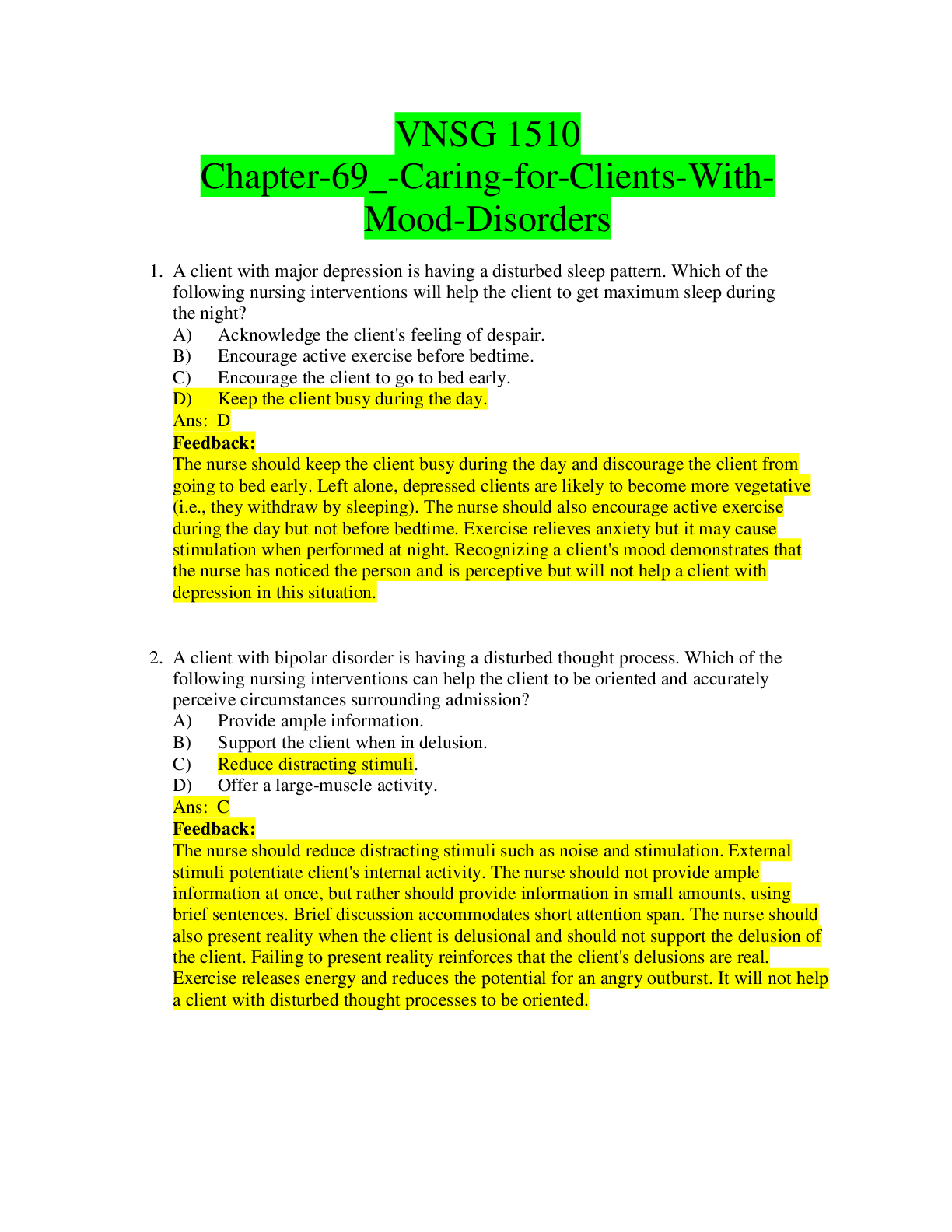
Instant download
Reviews( 0 )
Document information
Connected school, study & course
About the document
Uploaded On
Apr 28, 2020
Number of pages
14
Written in
Additional information
This document has been written for:
Uploaded
Apr 28, 2020
Downloads
0
Views
53

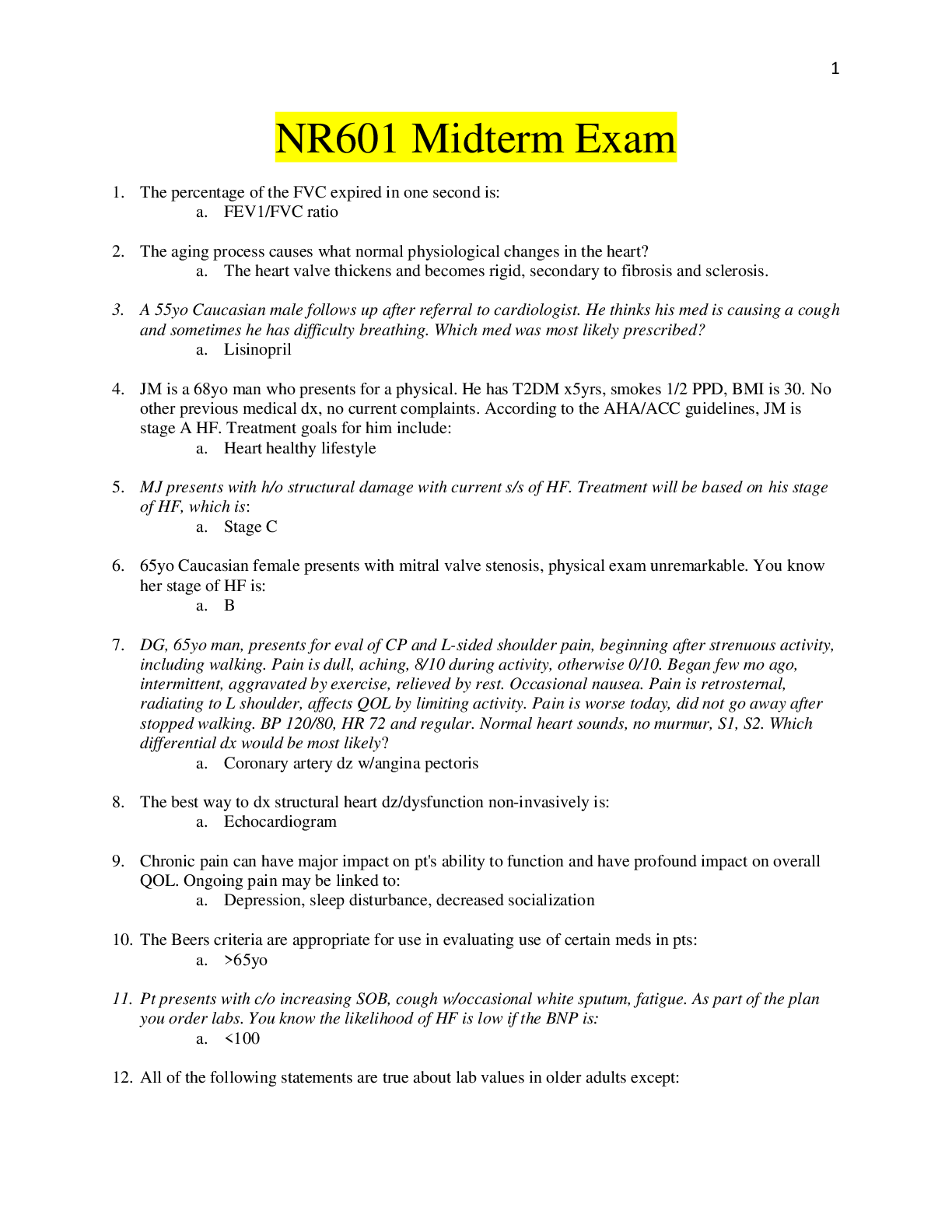
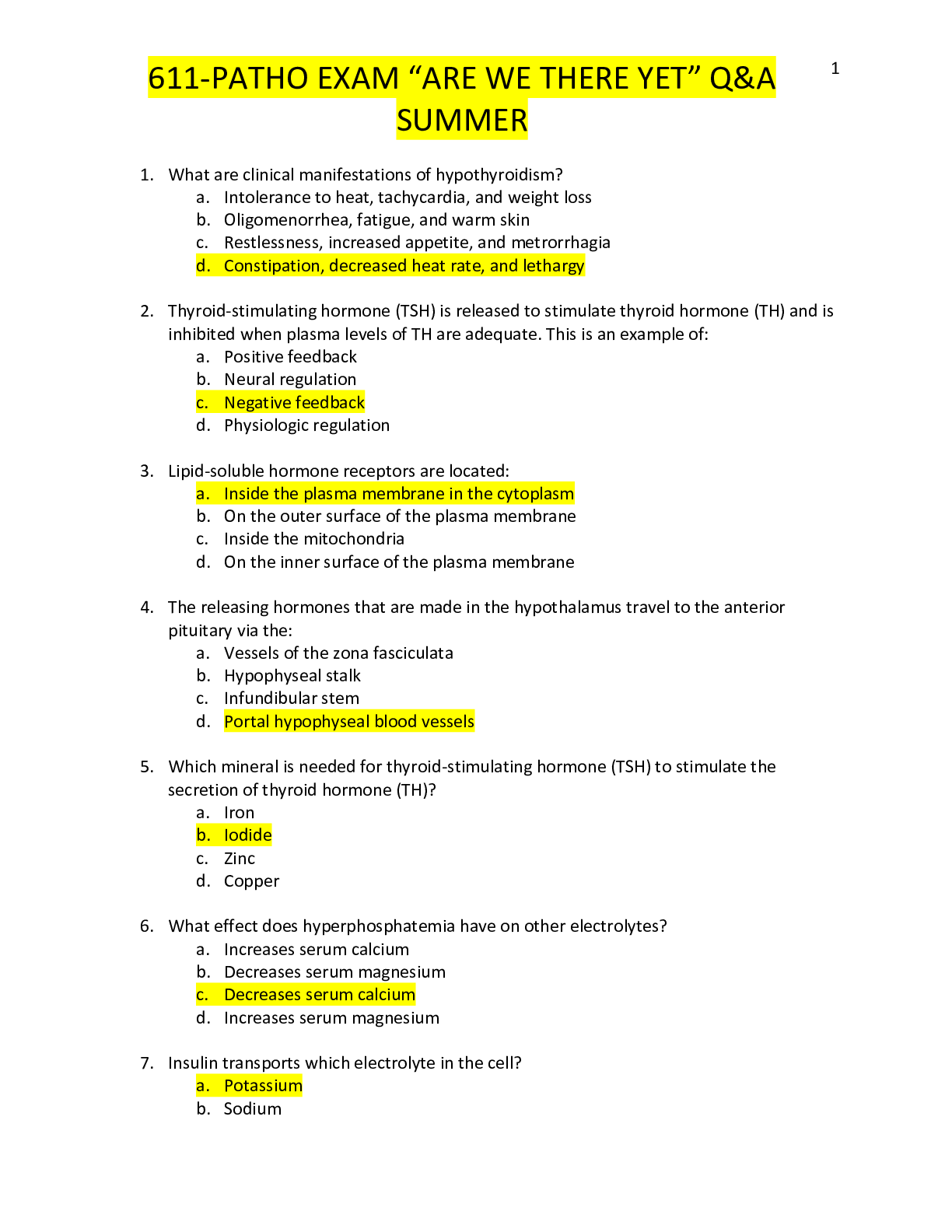
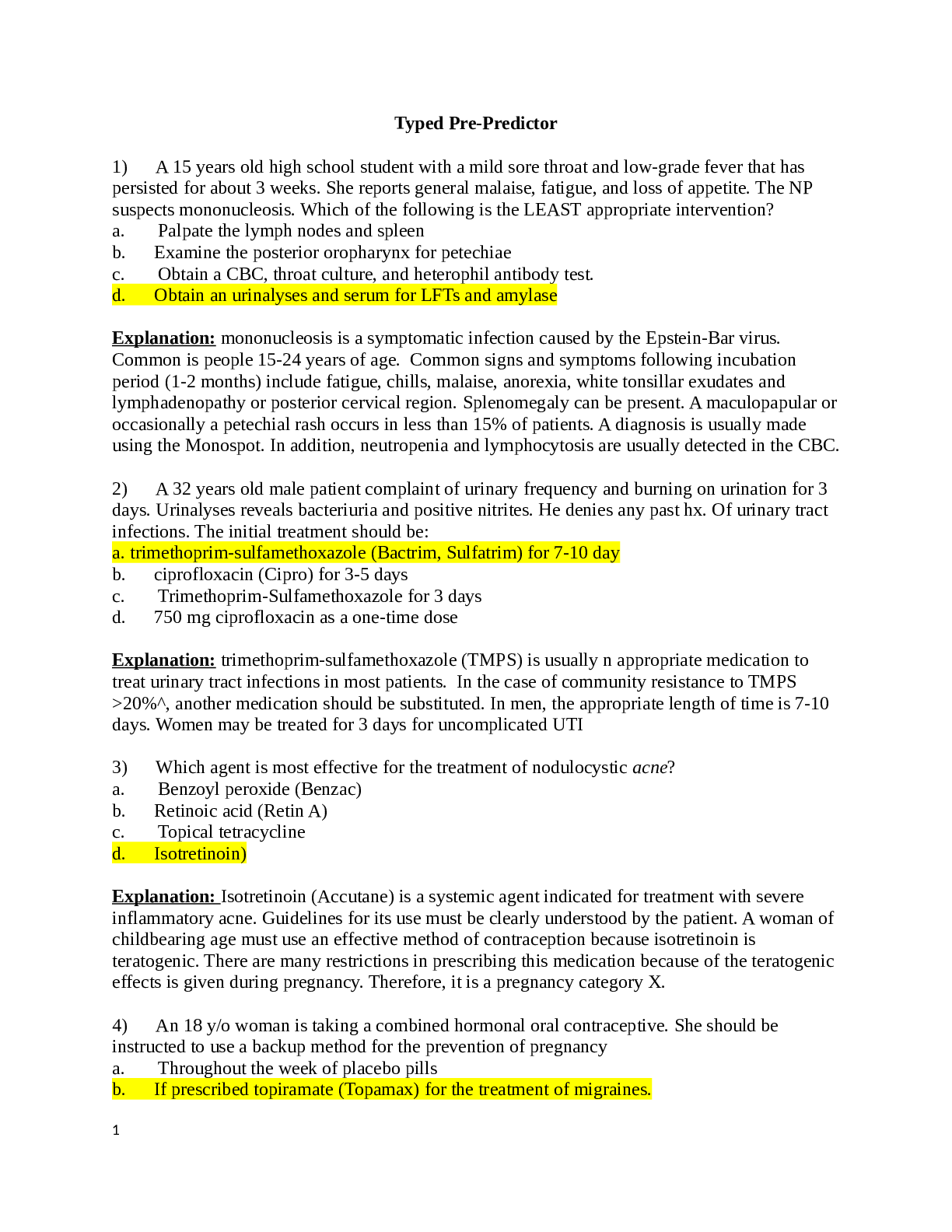
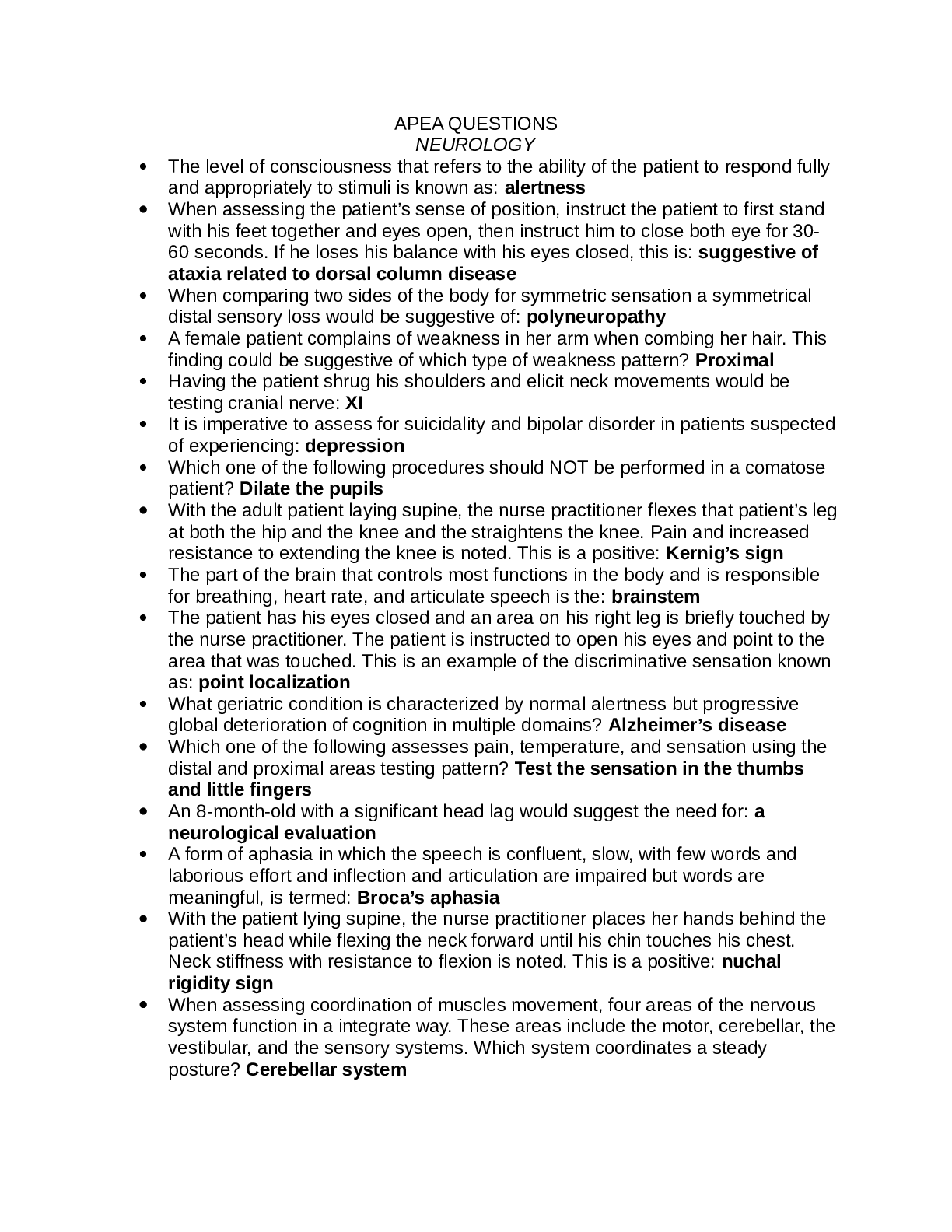
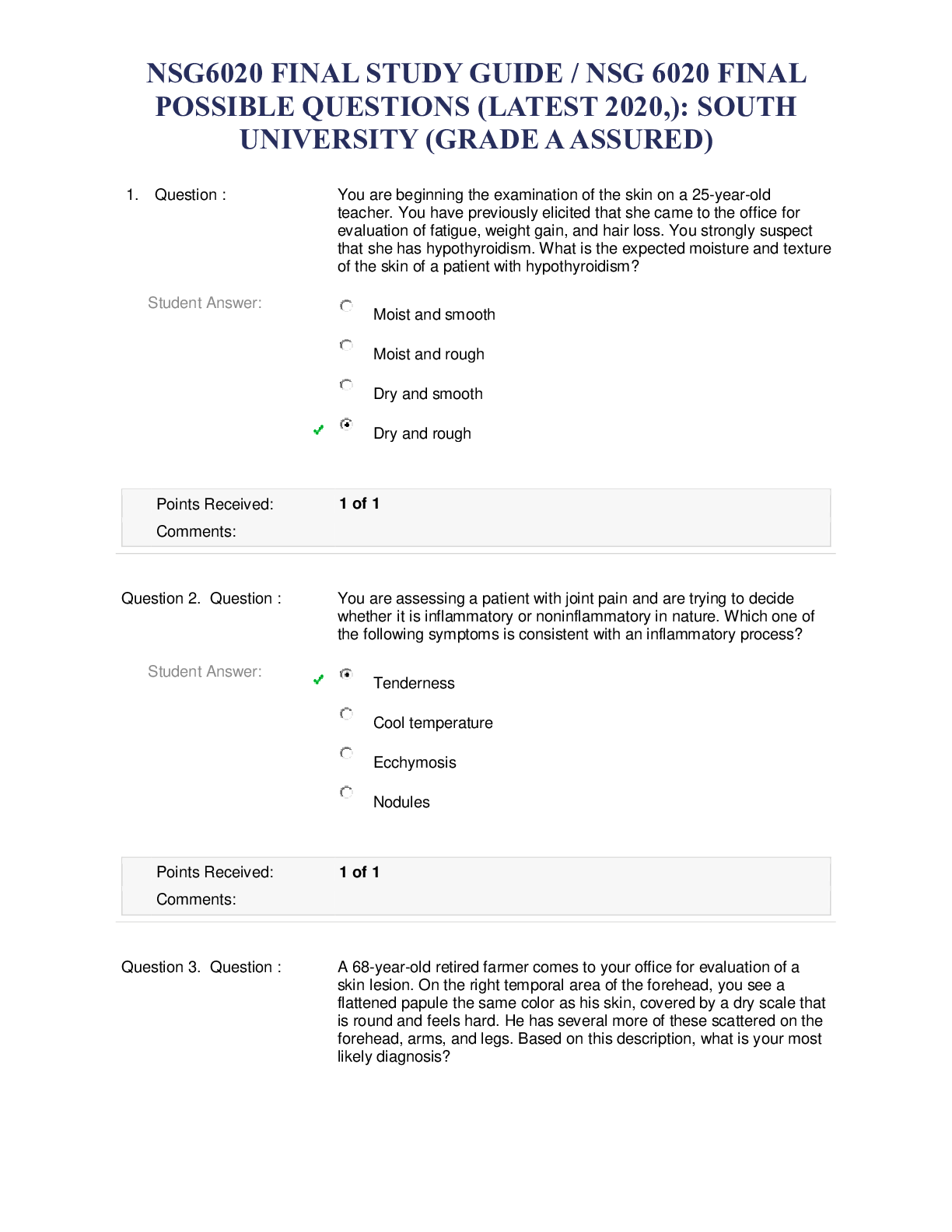
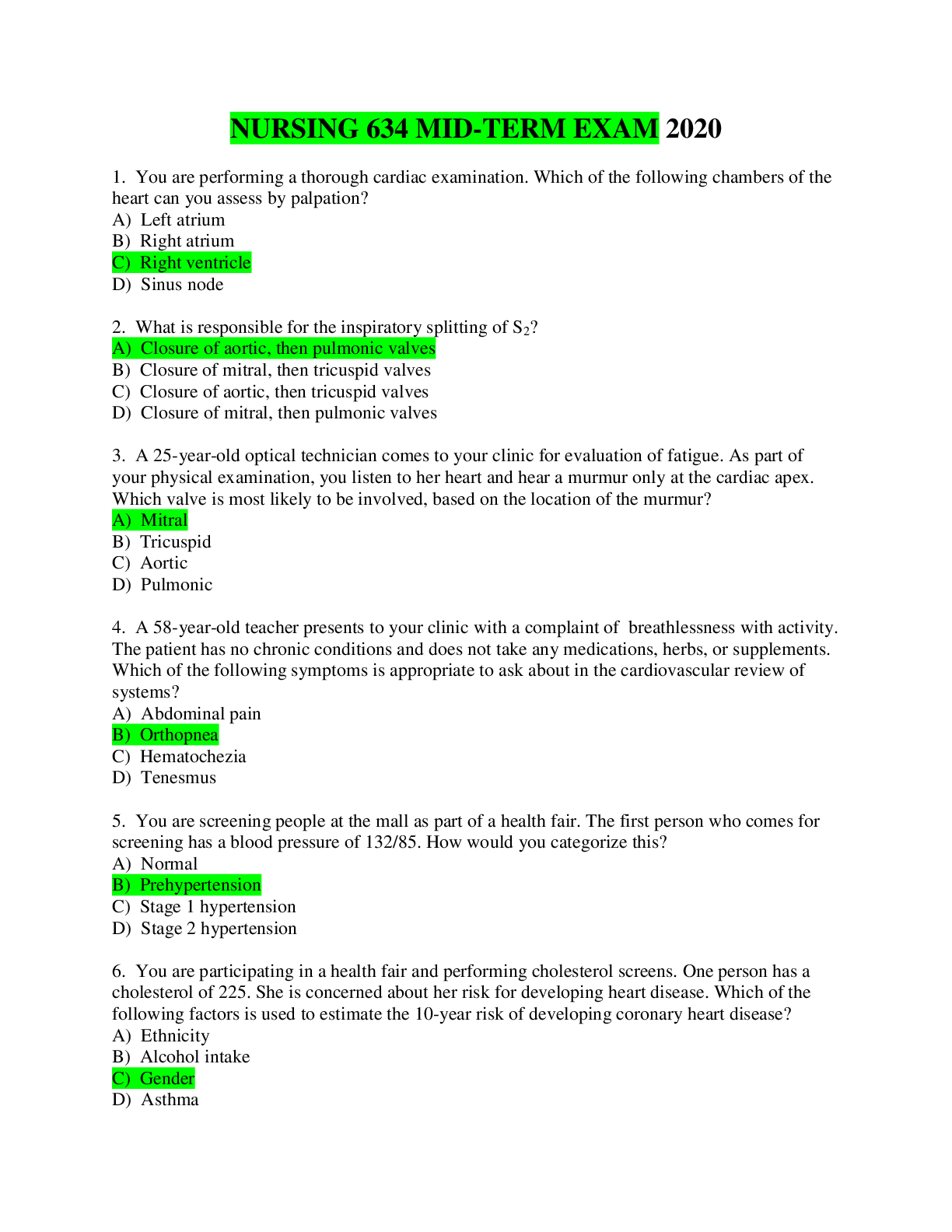
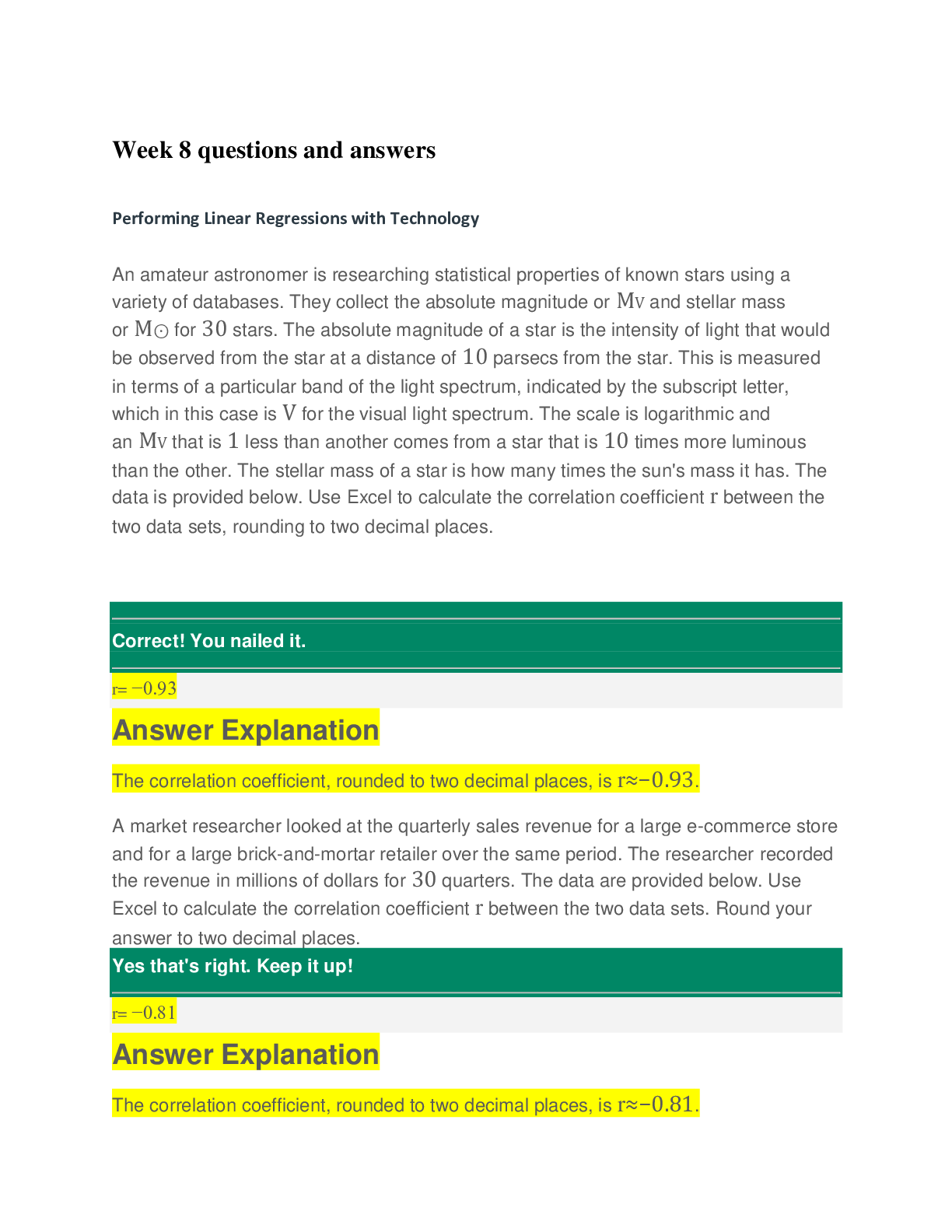
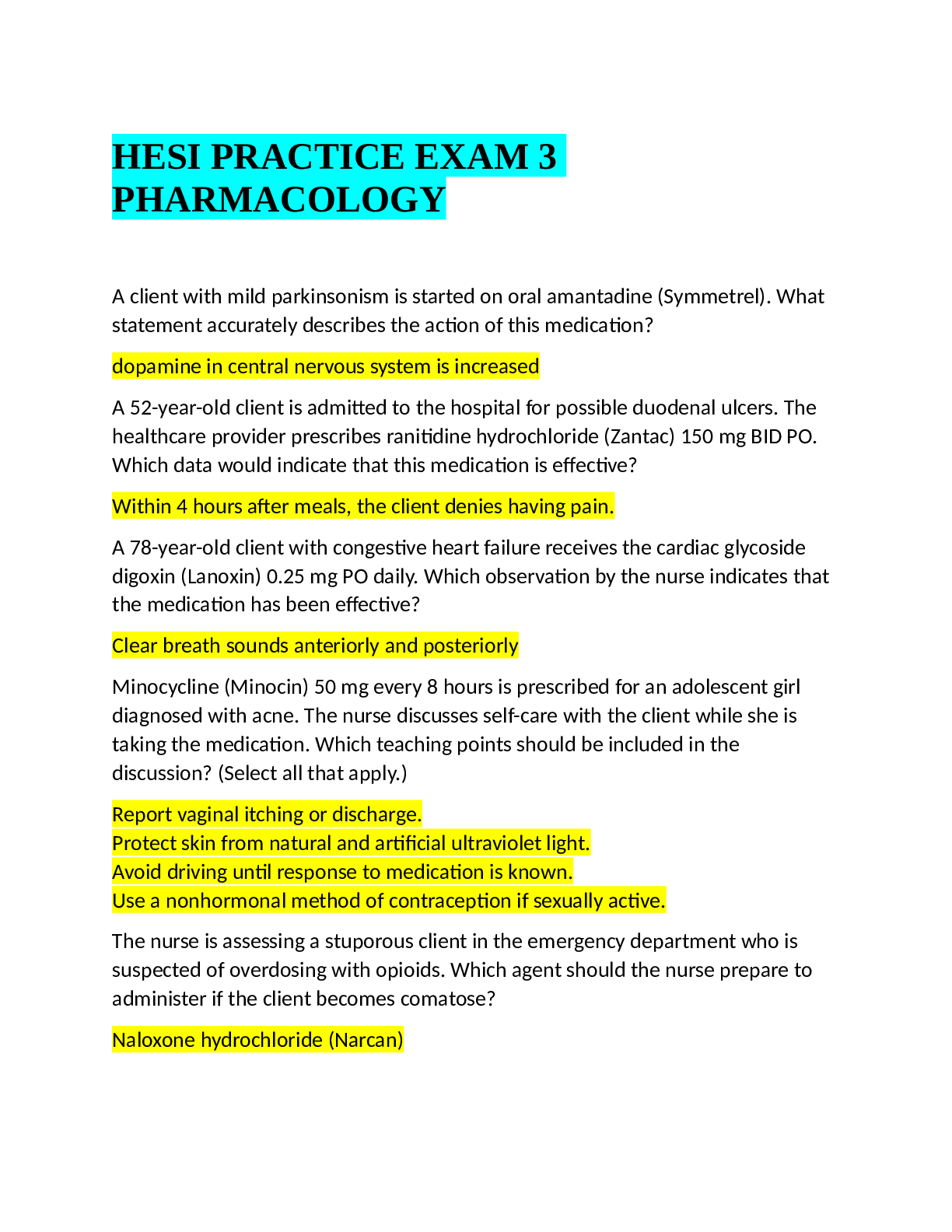
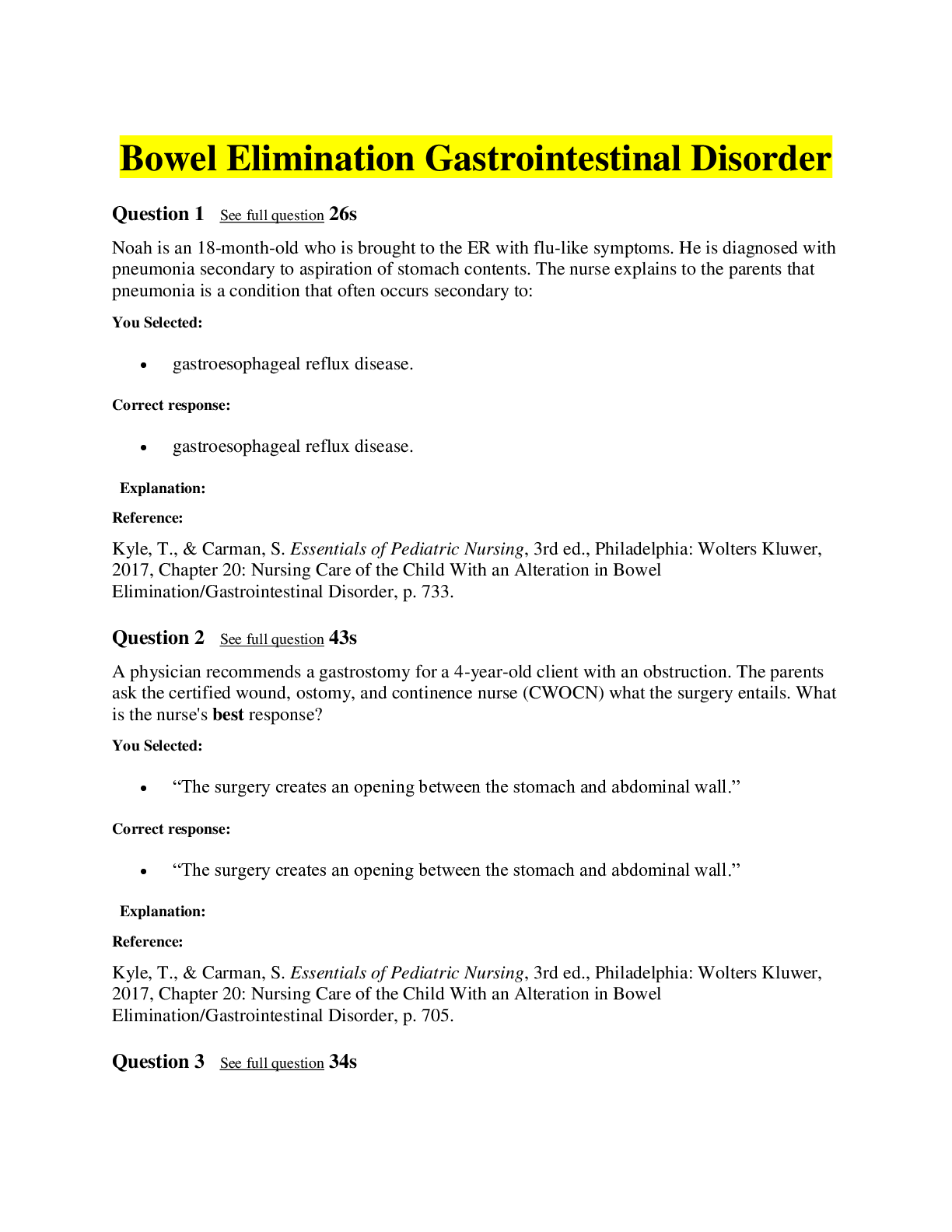

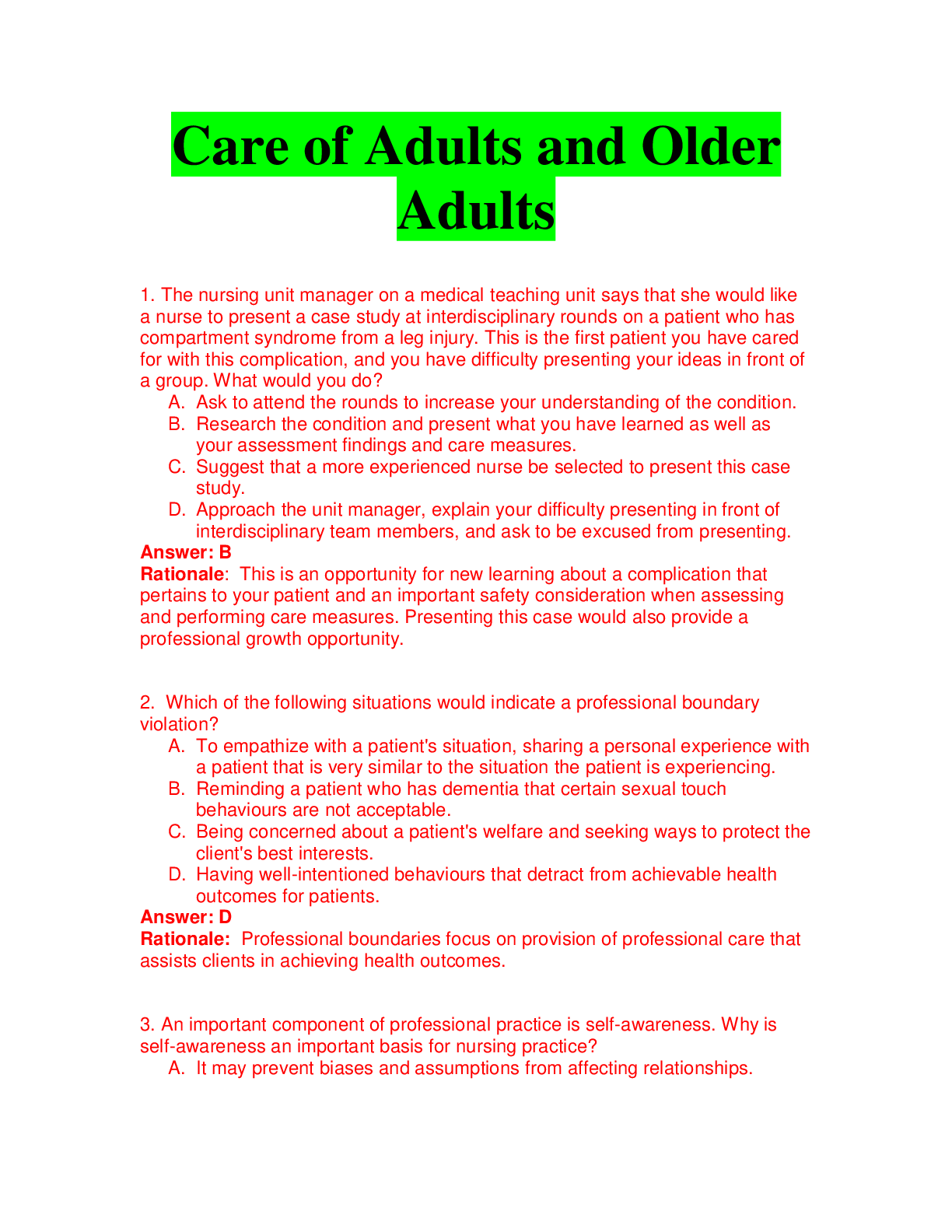
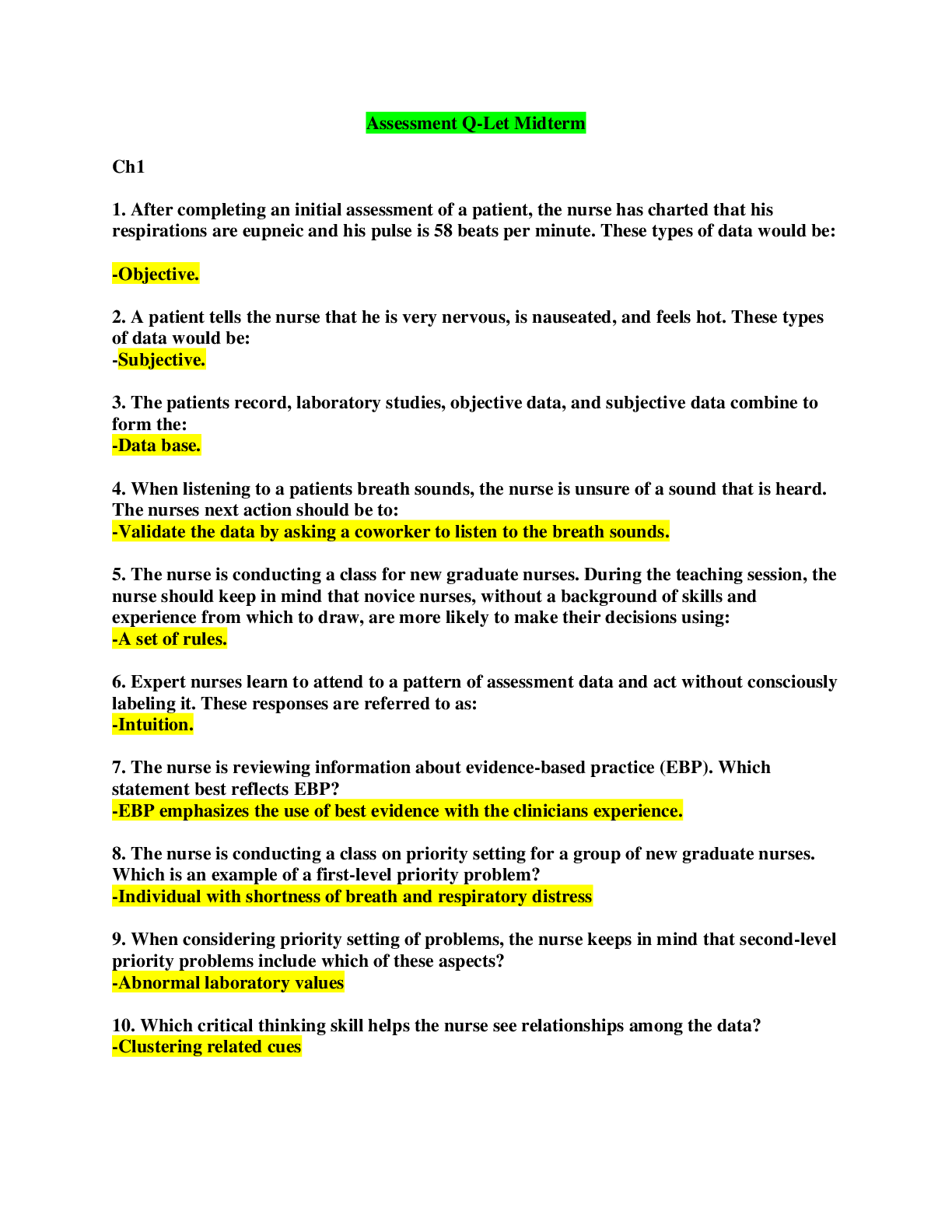
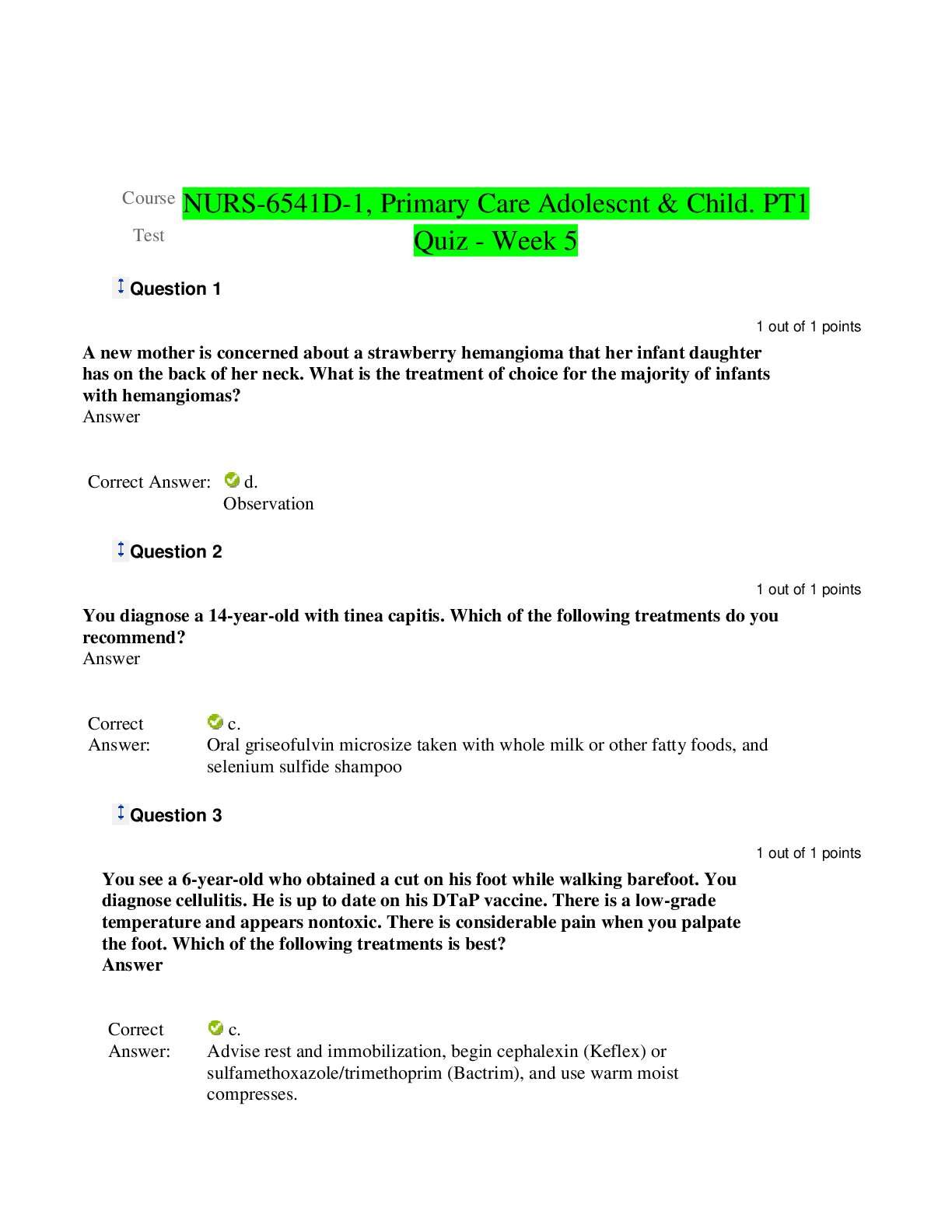

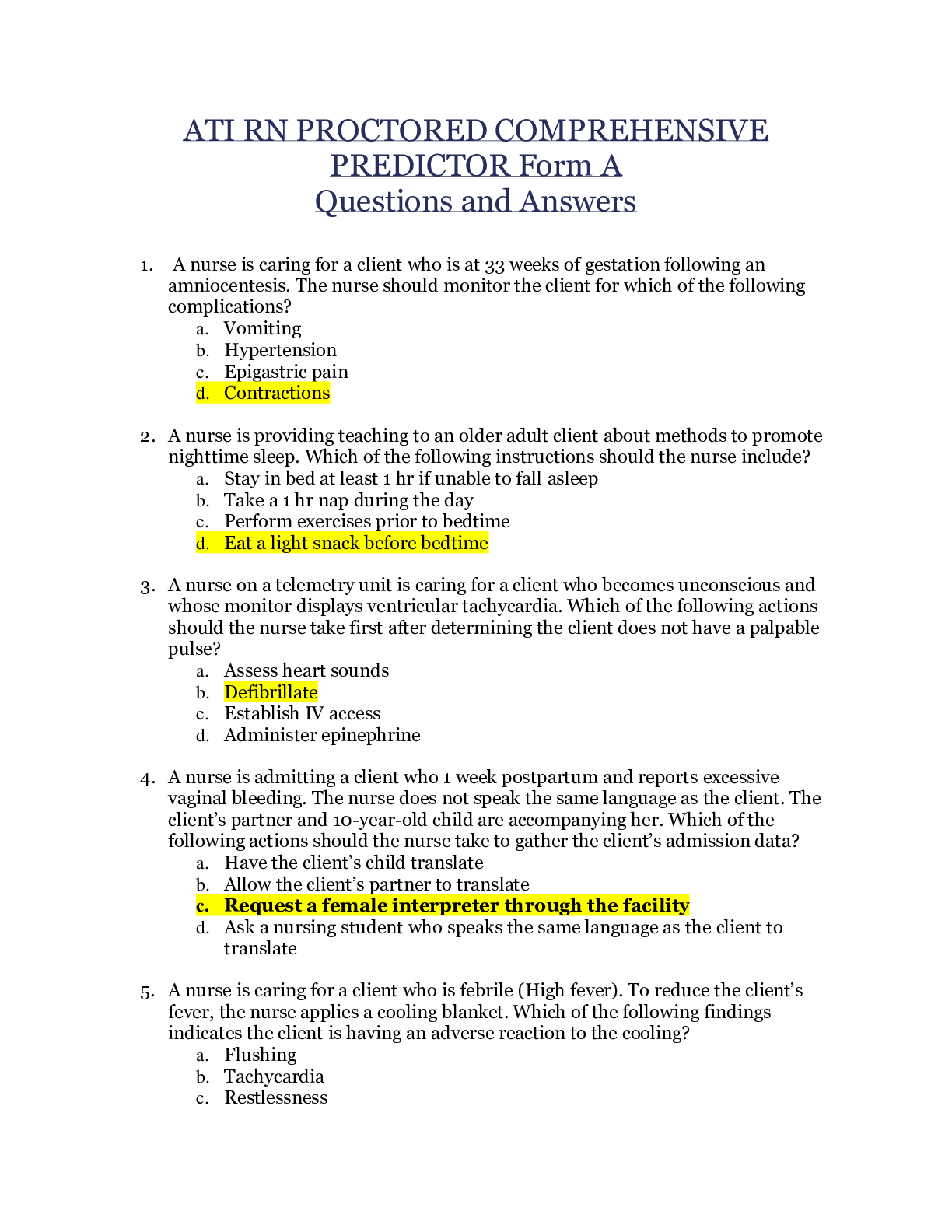
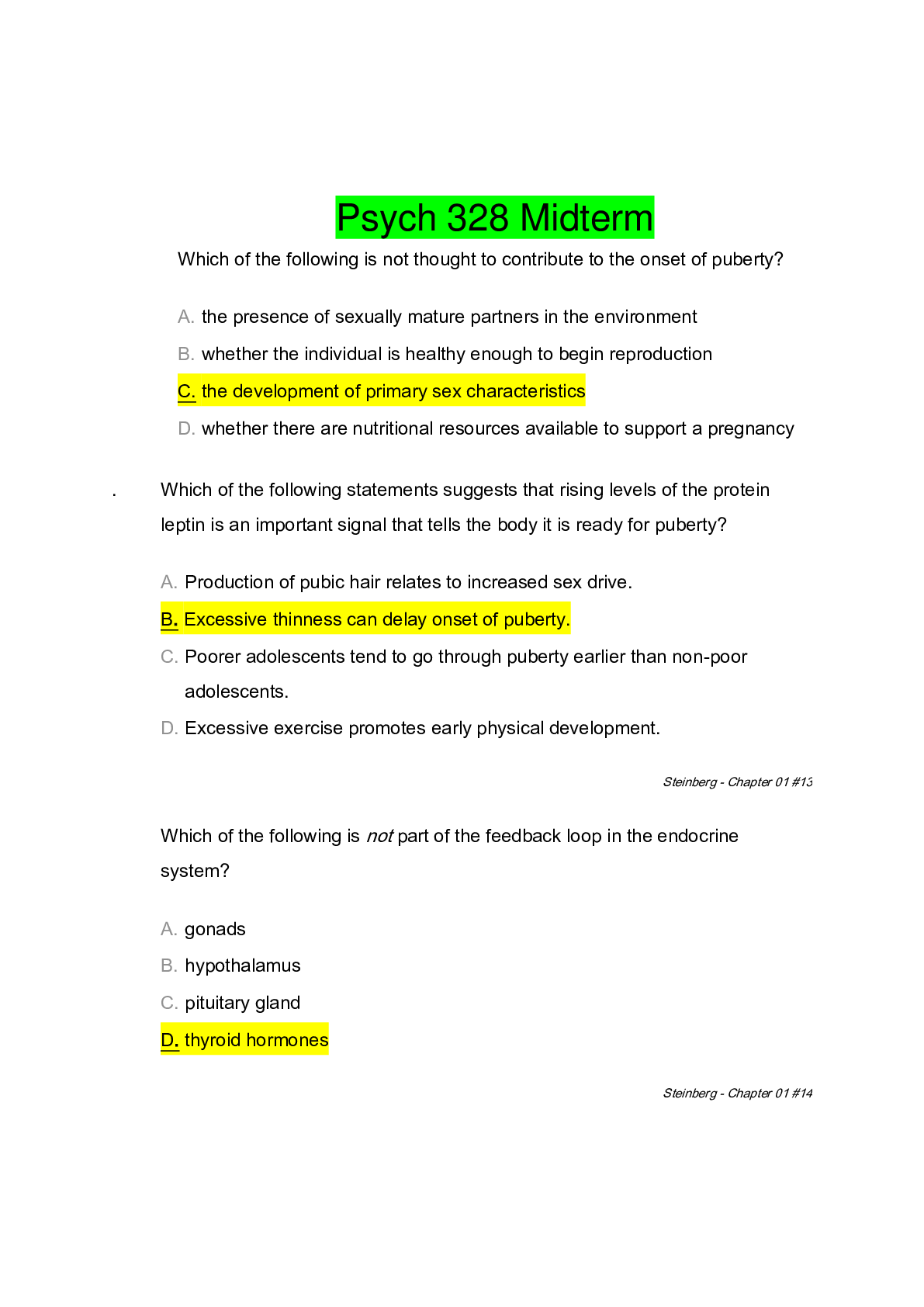
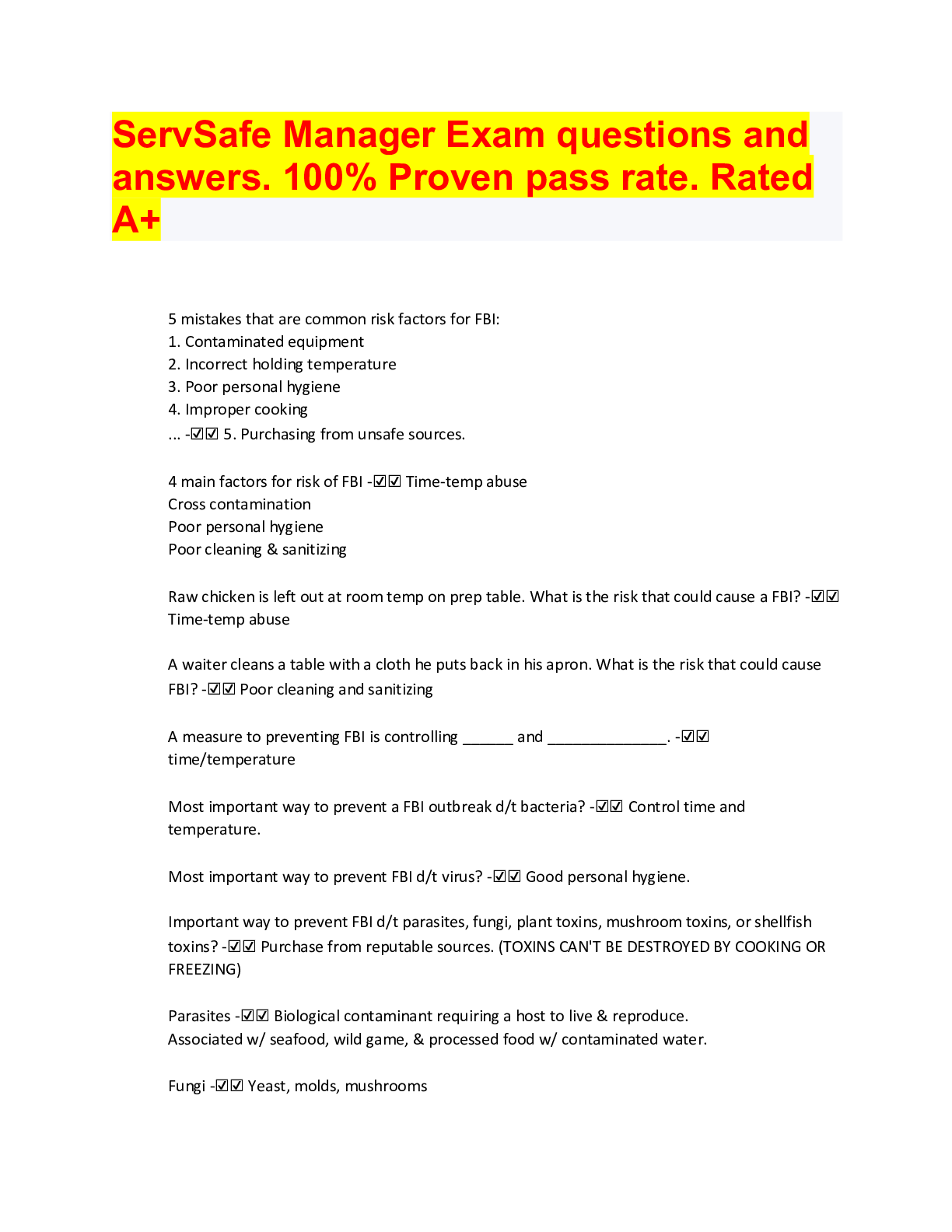
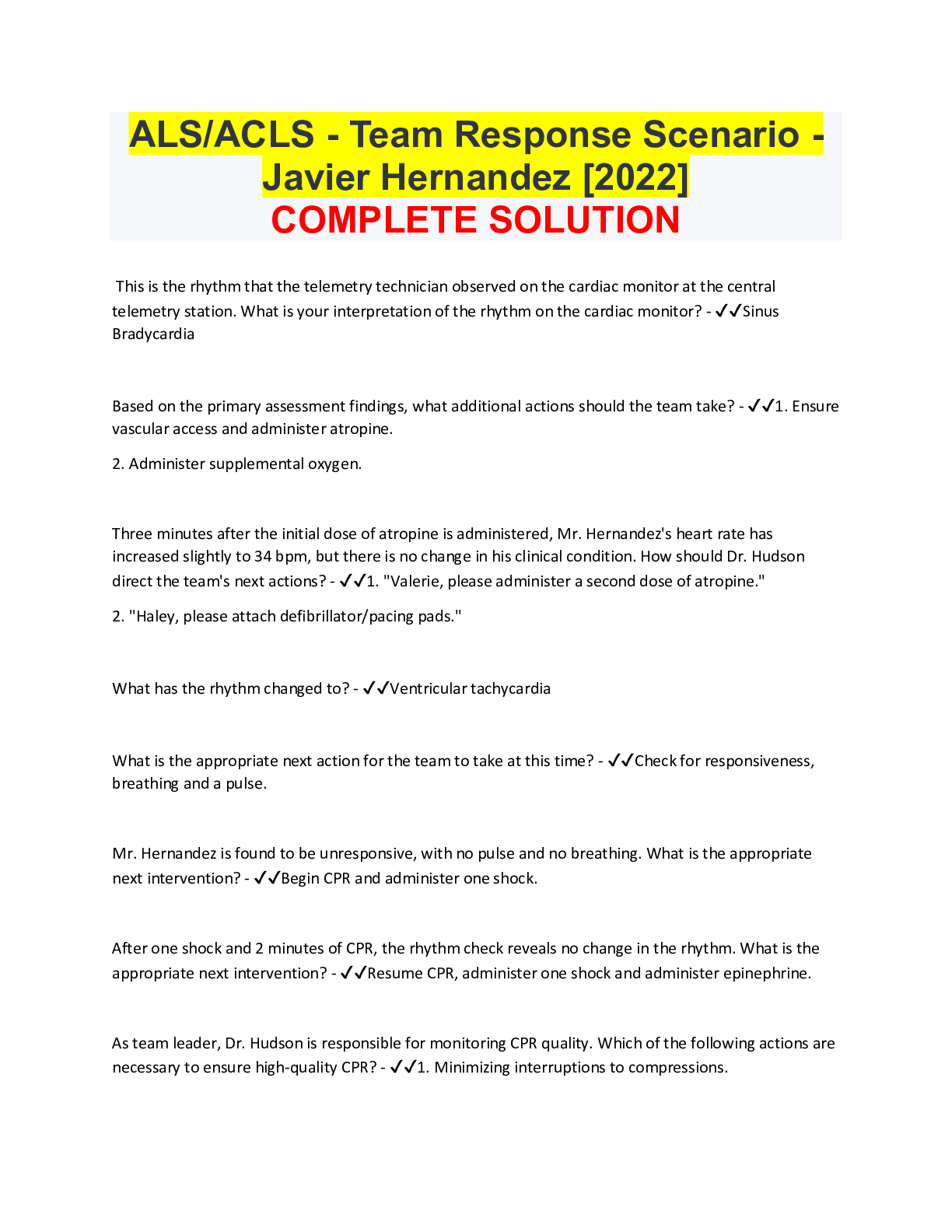
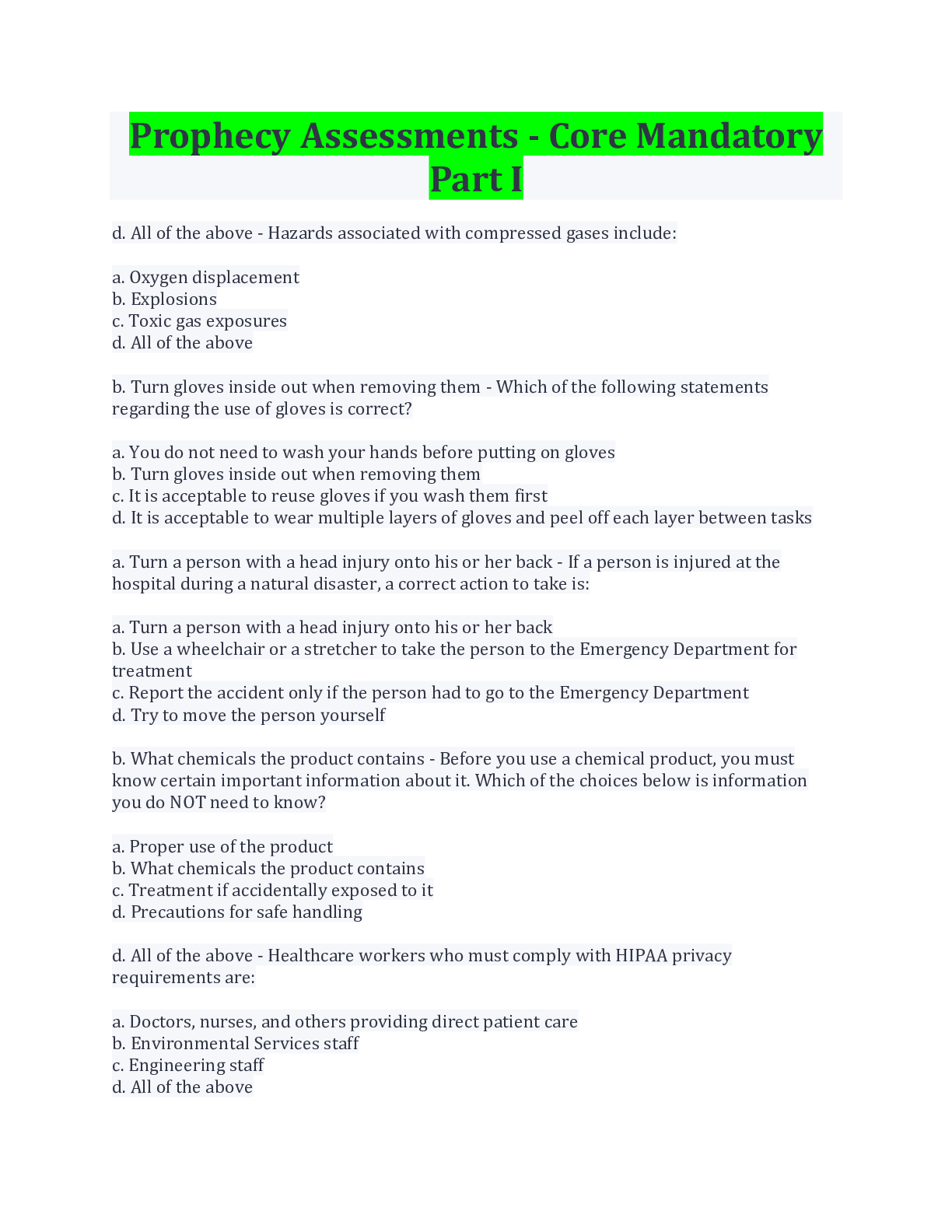
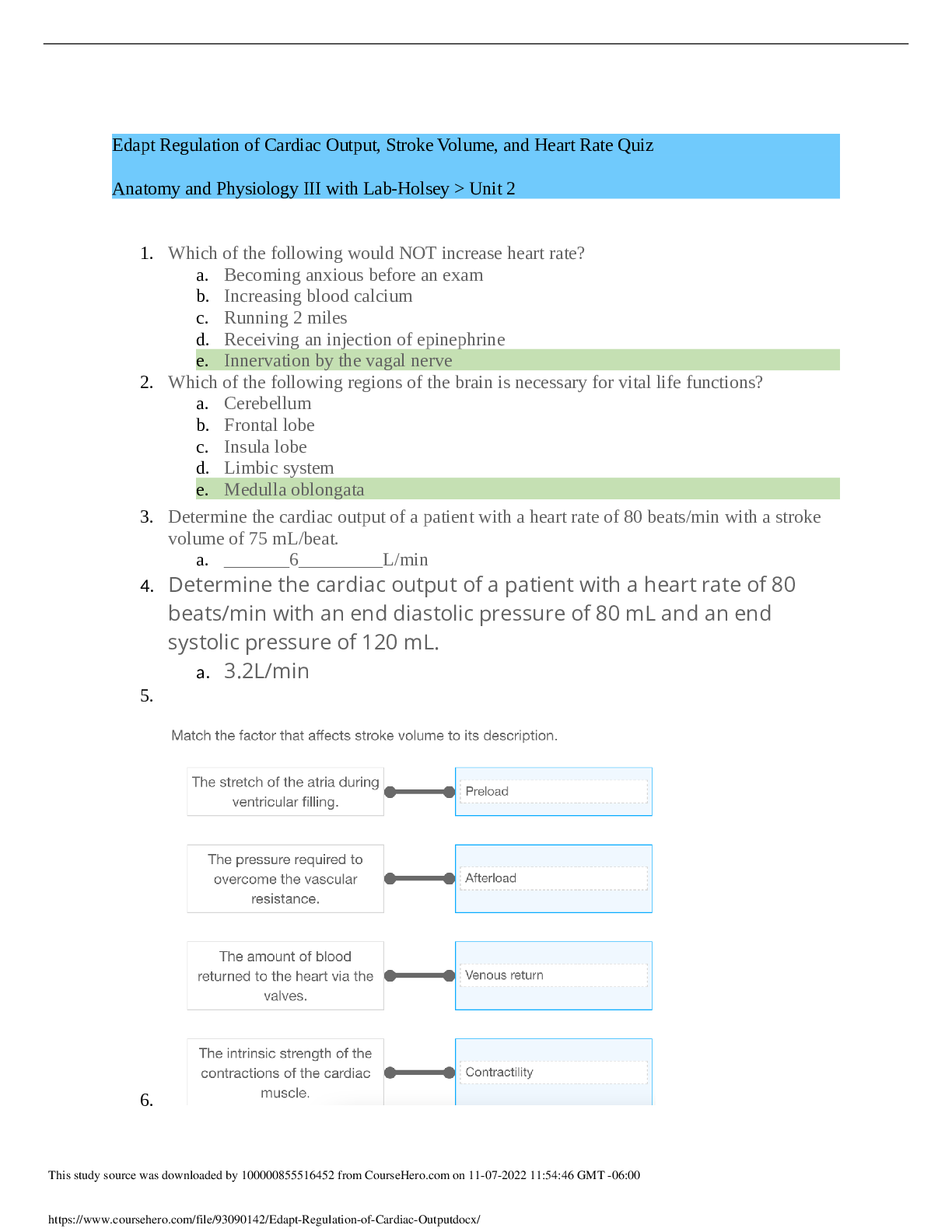
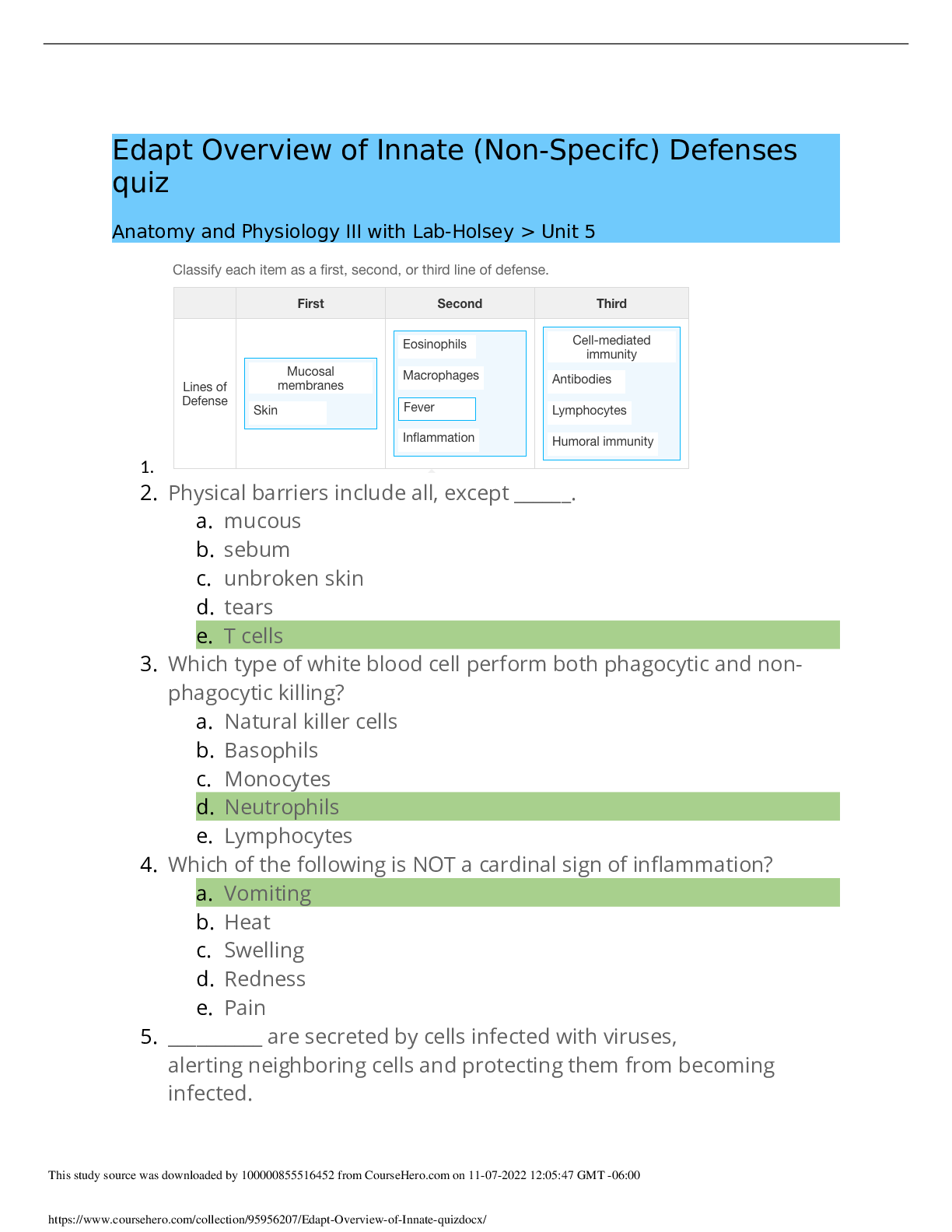
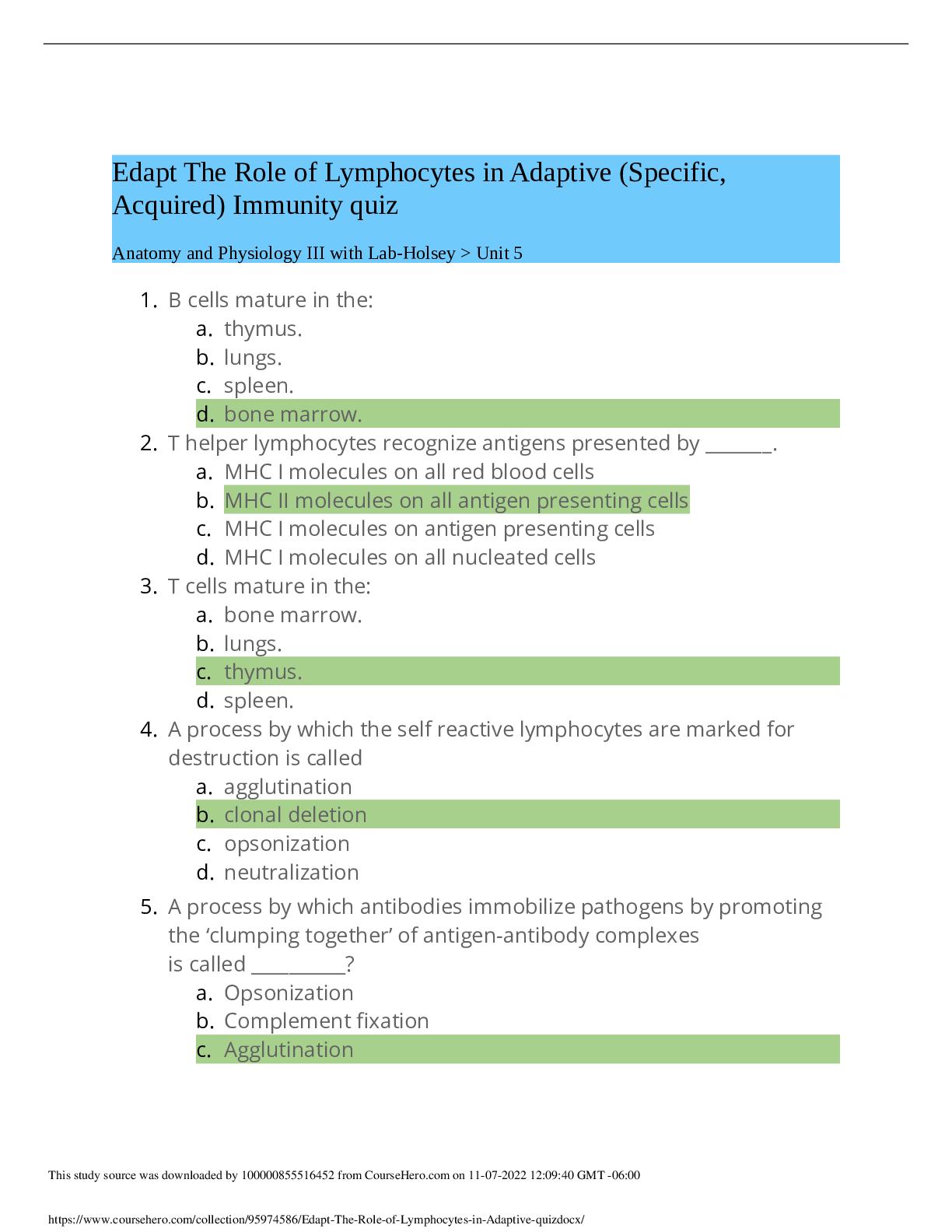
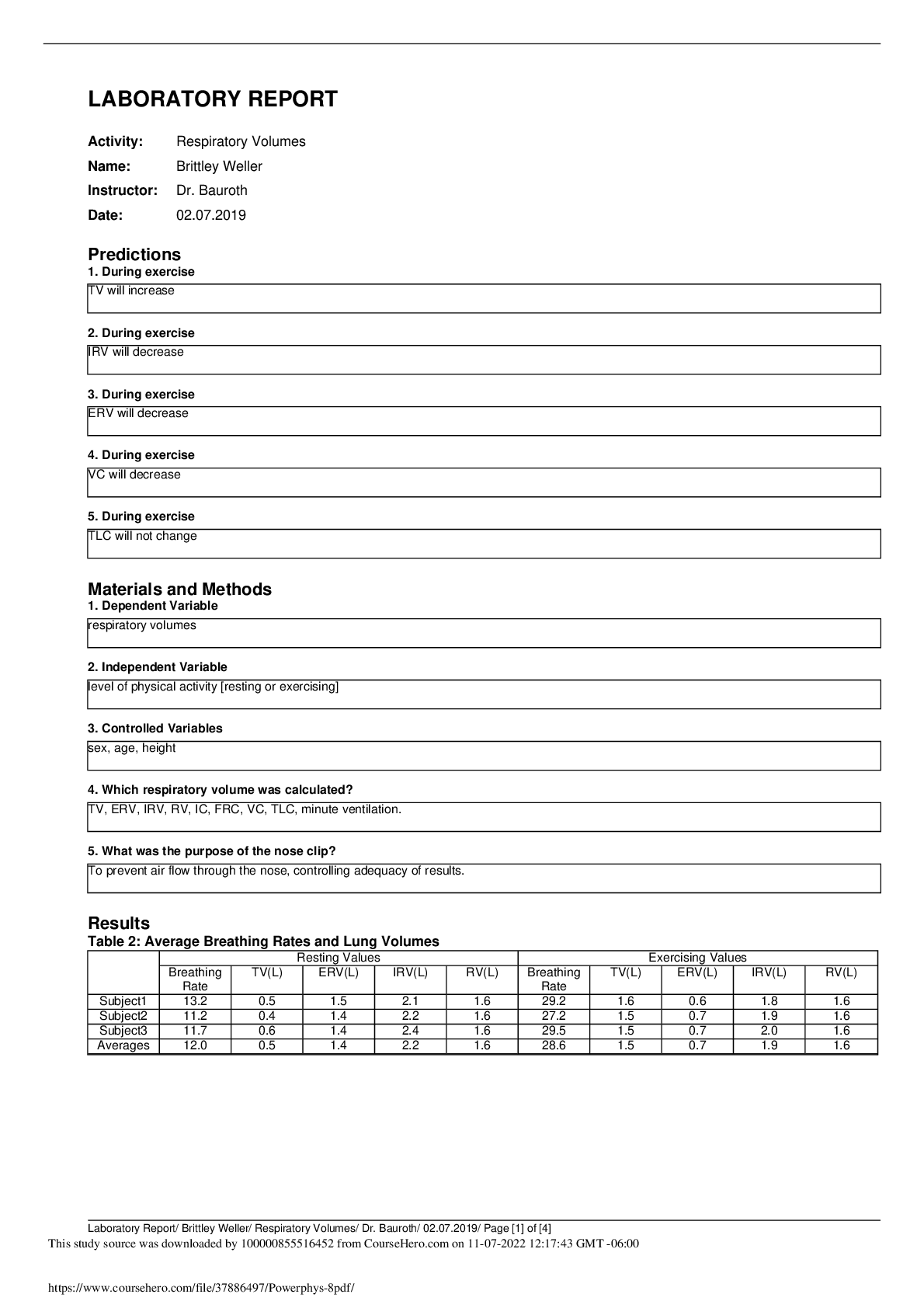
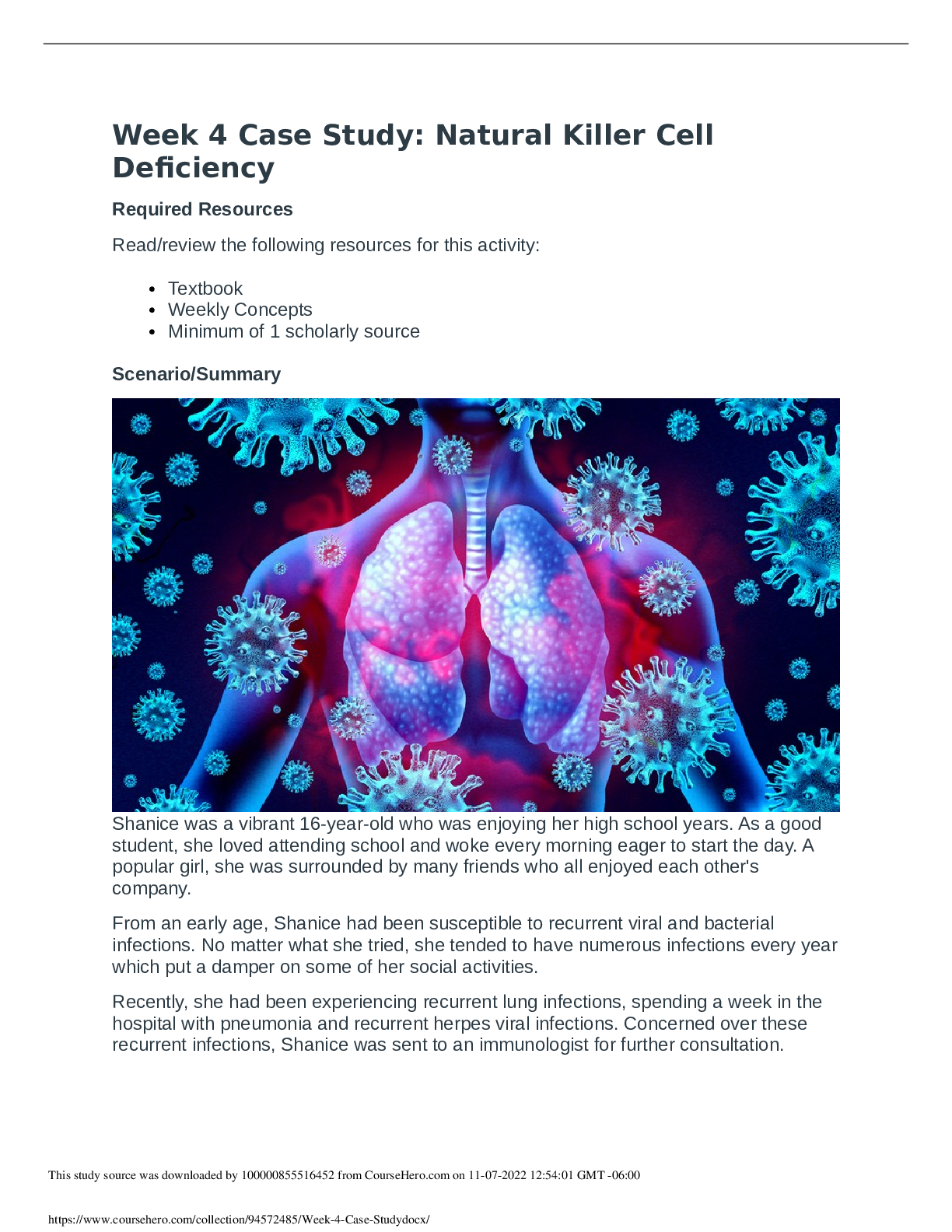
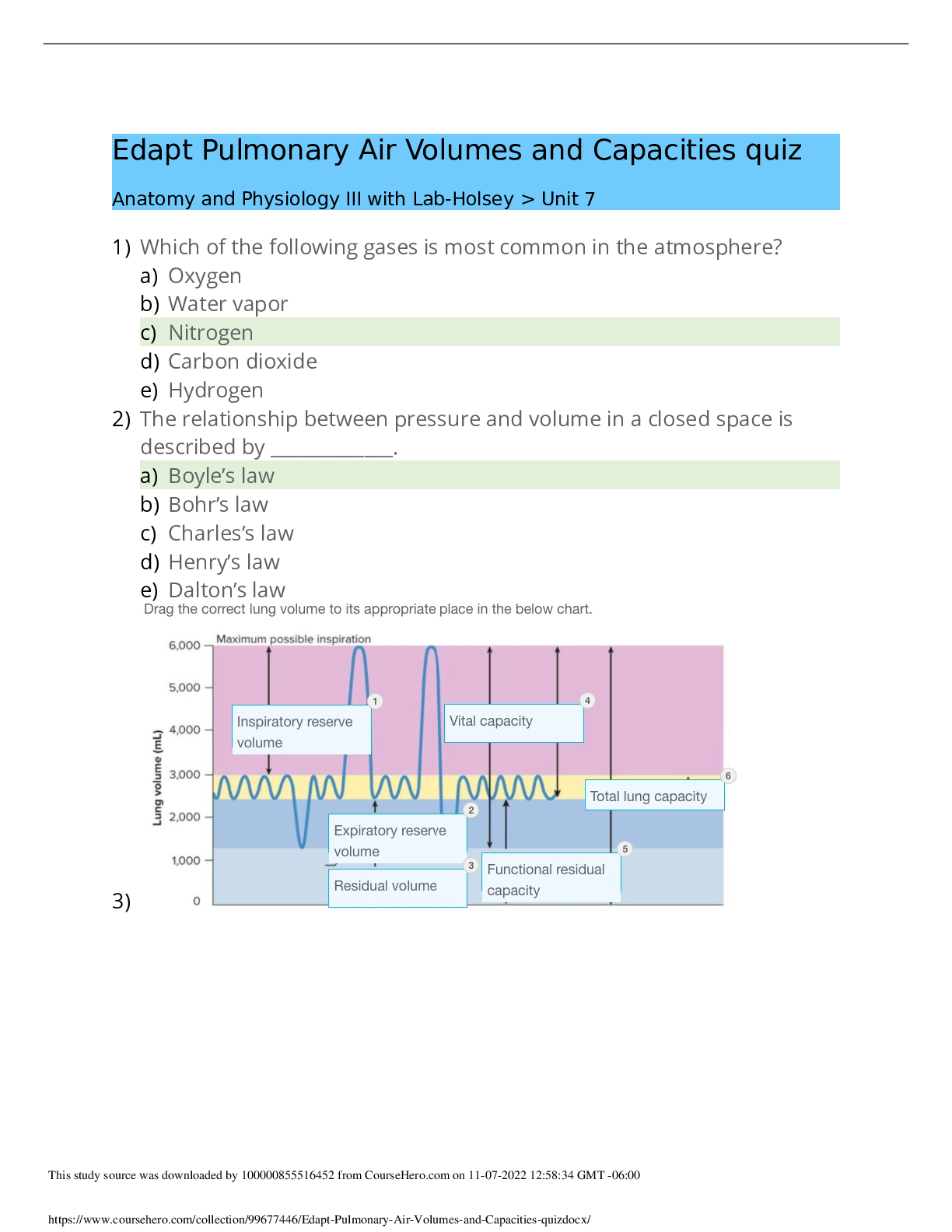
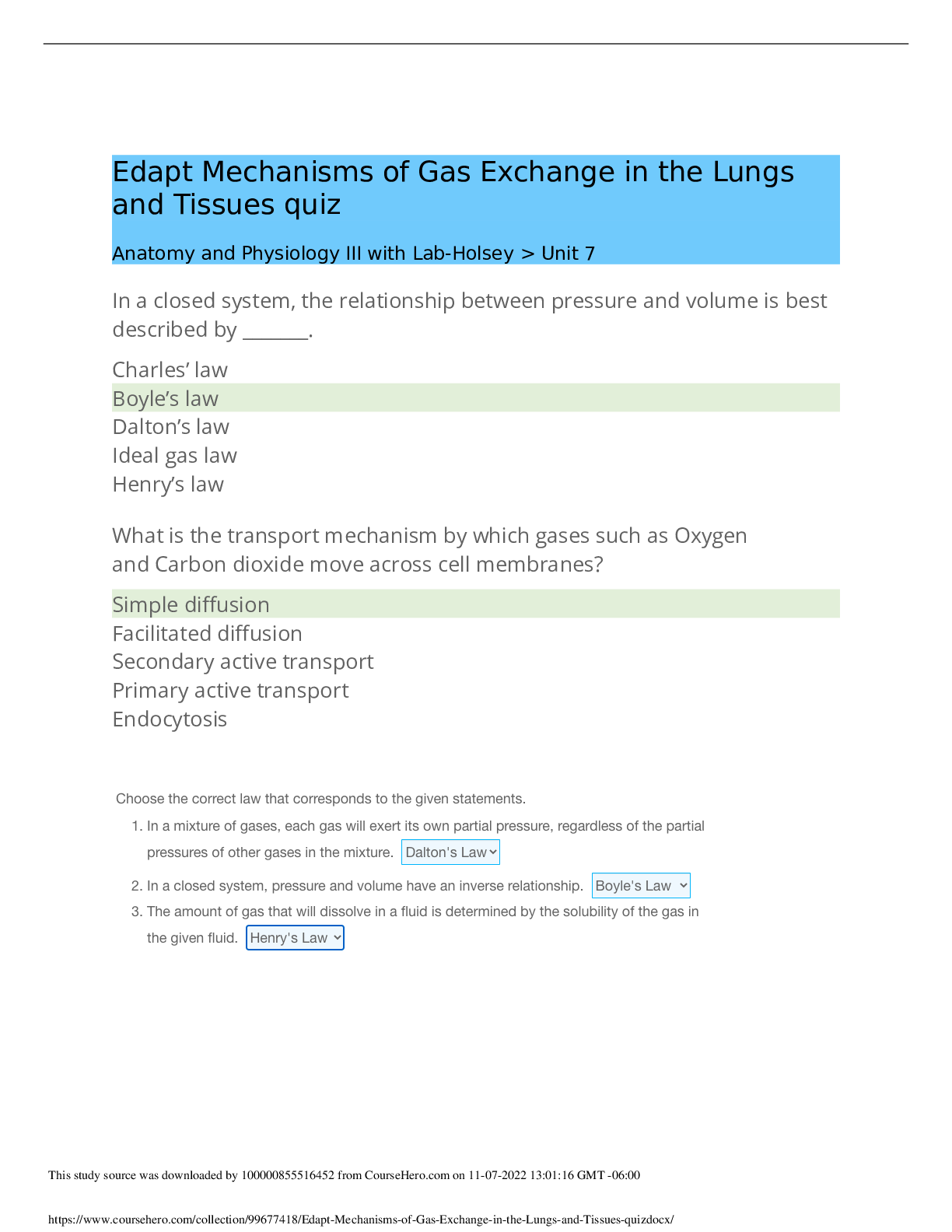
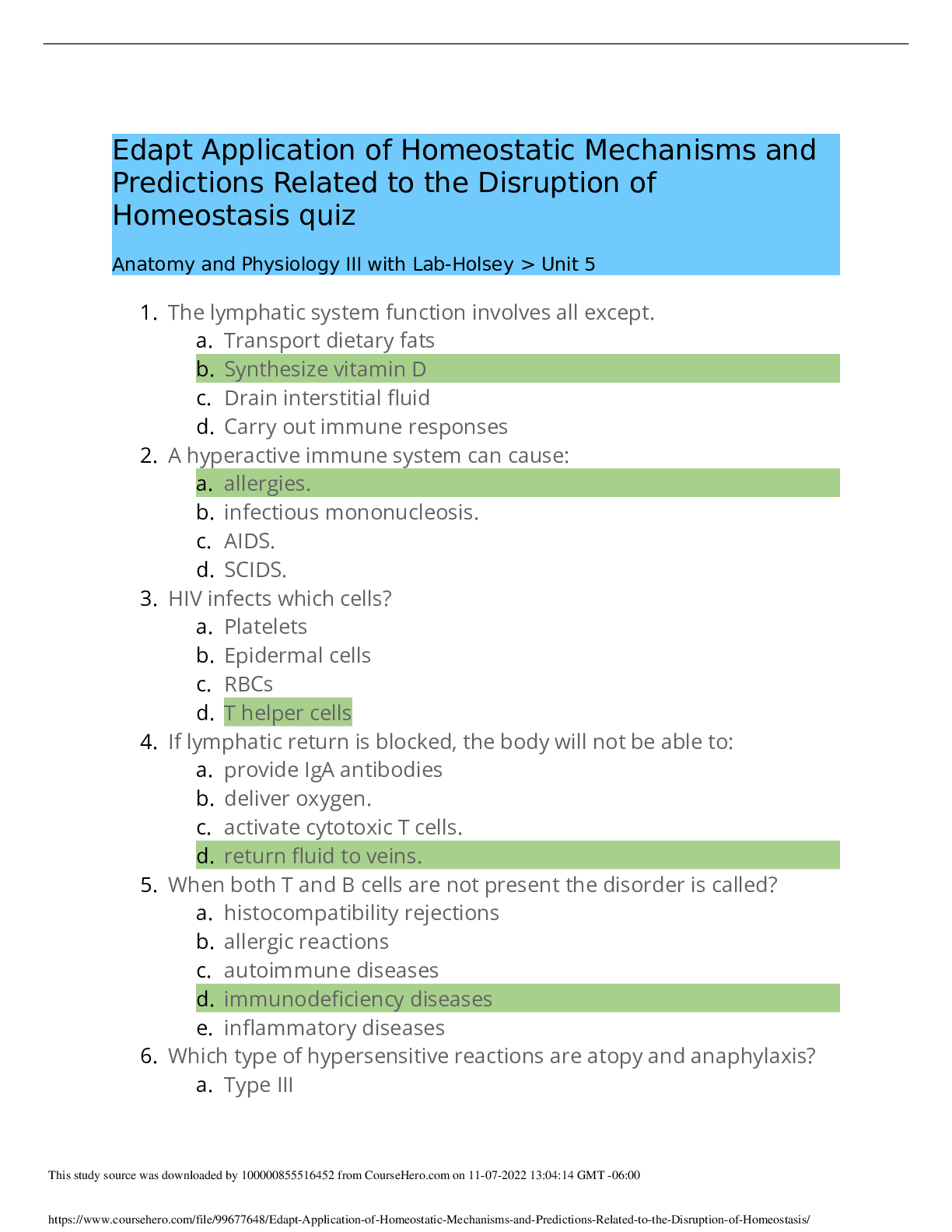
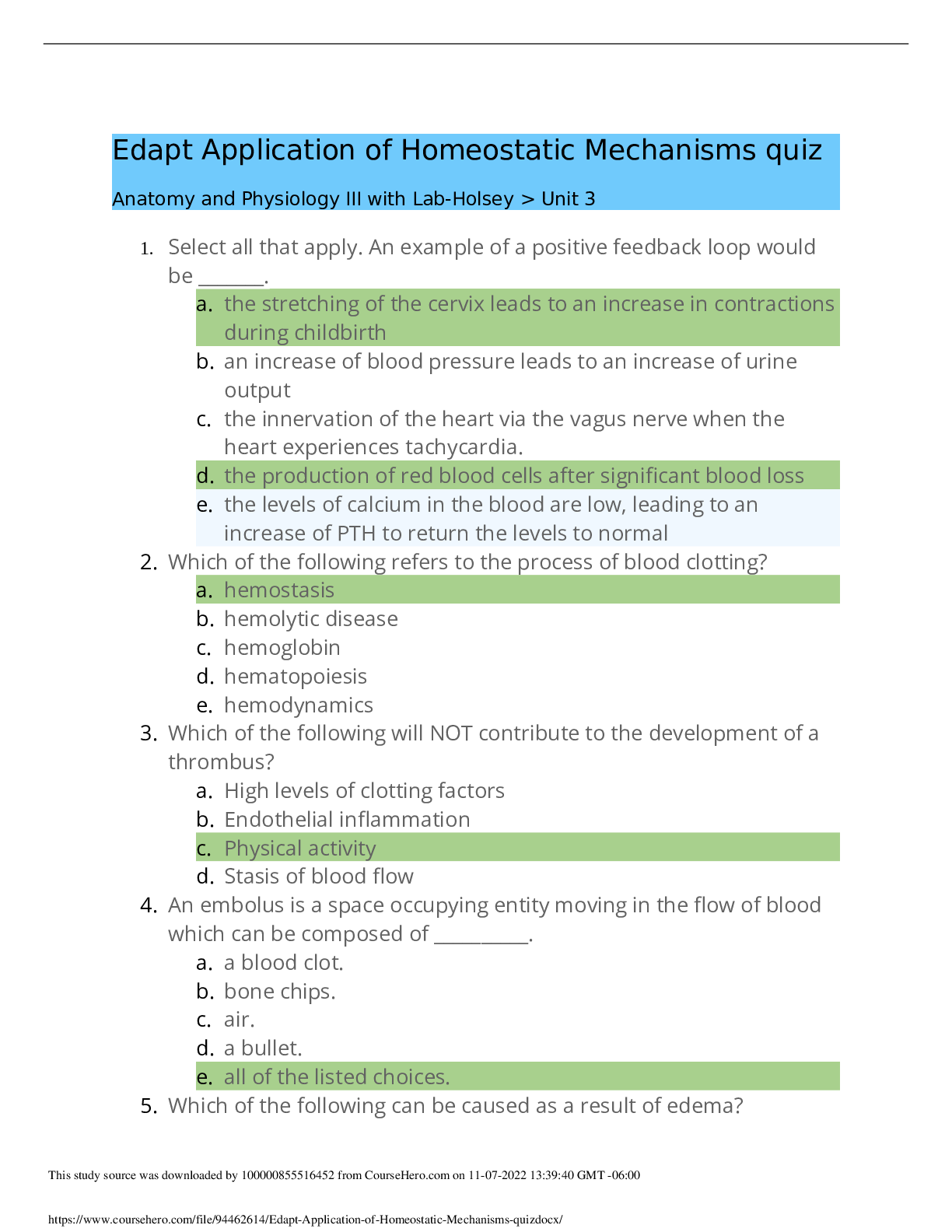
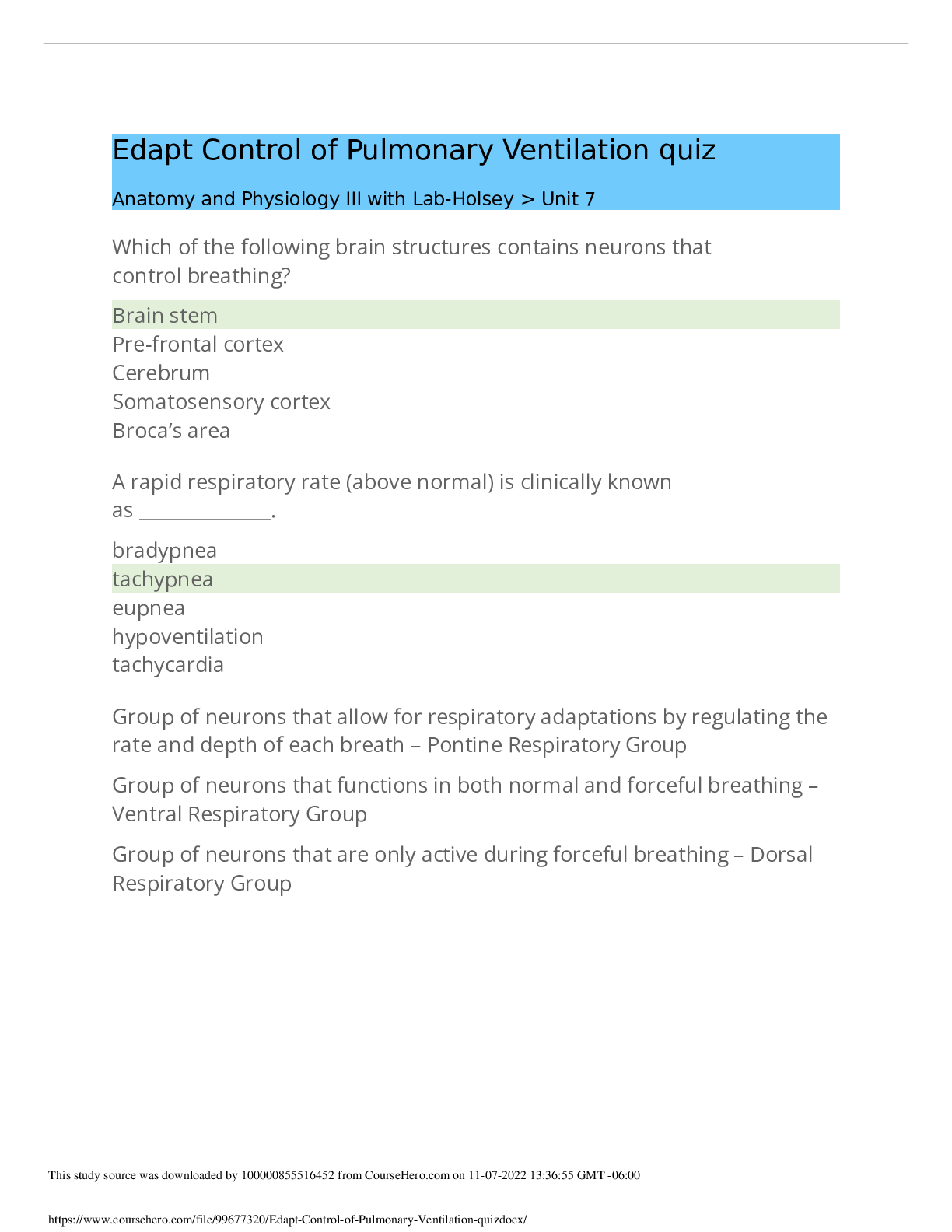
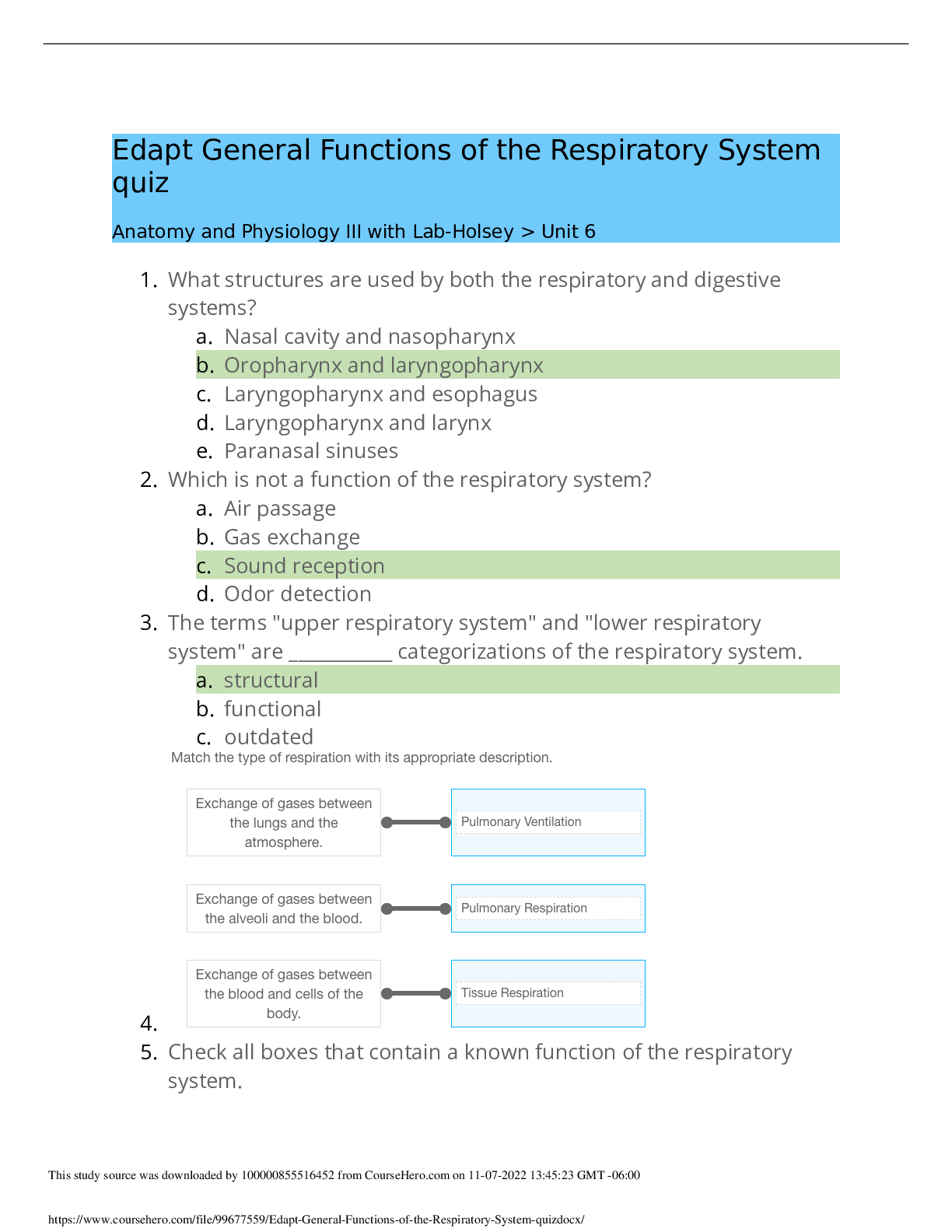
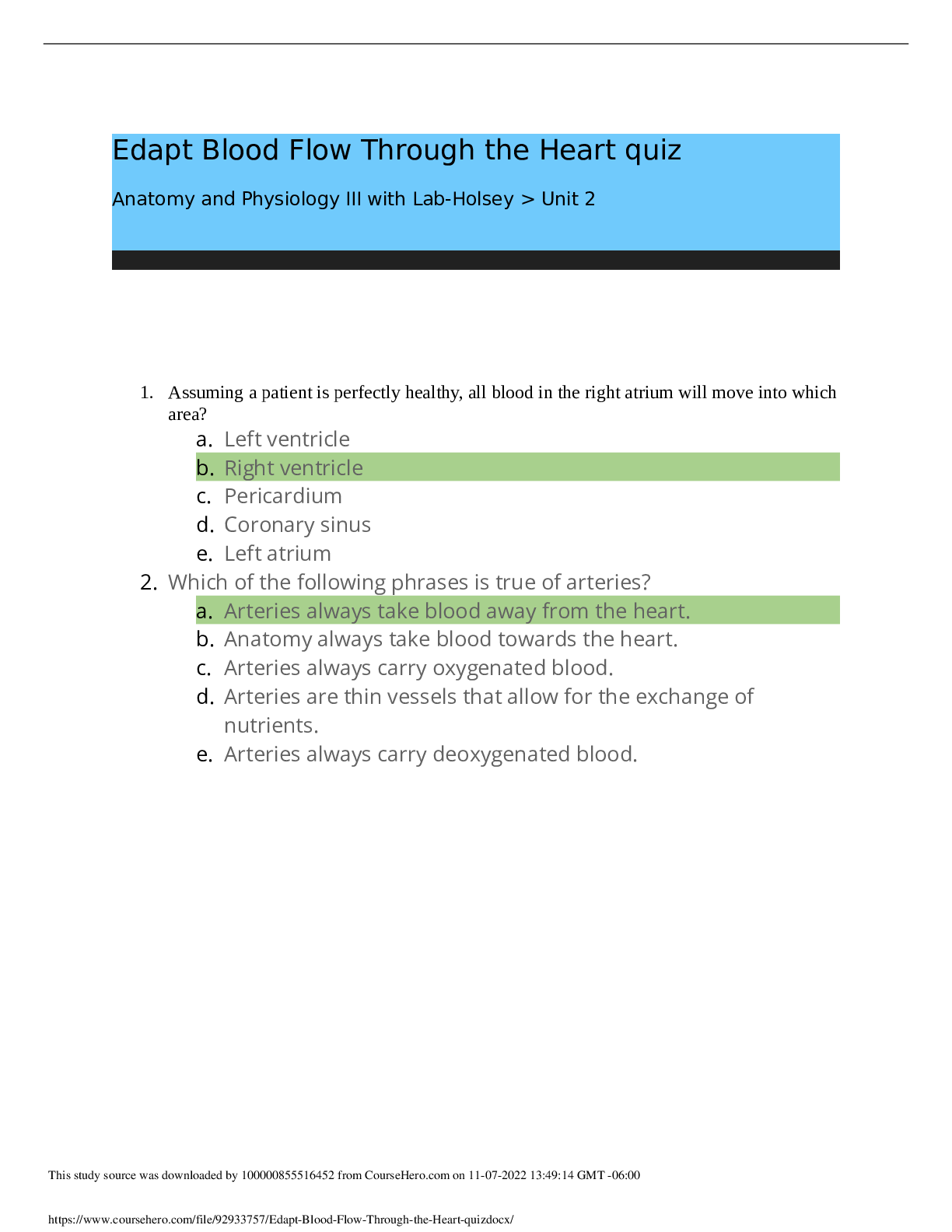
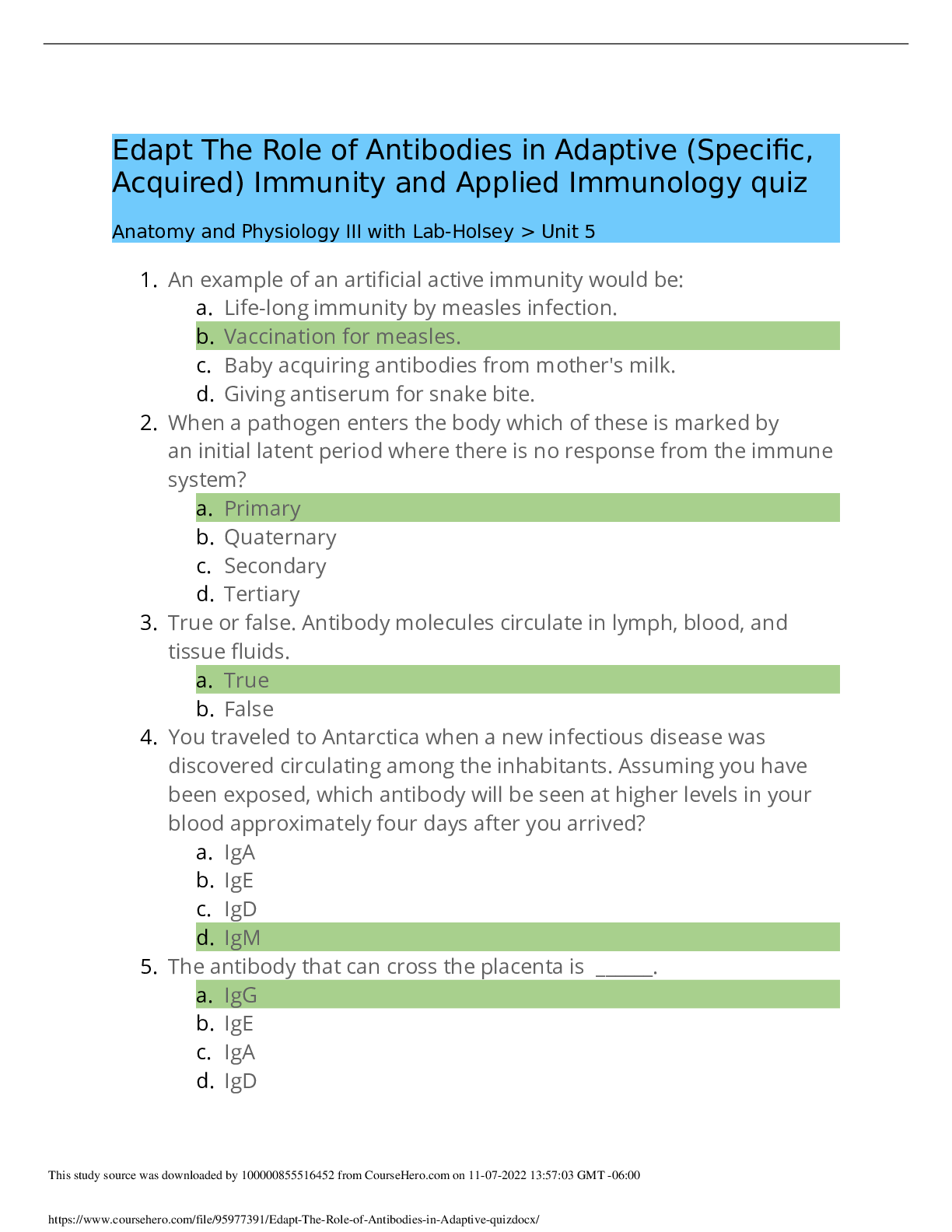
.png)
.png)

